#voltron analysis
Text
Lotor: The Man Behind the Mask
AKA The Many Faces of Lotor and Which is His True Face?
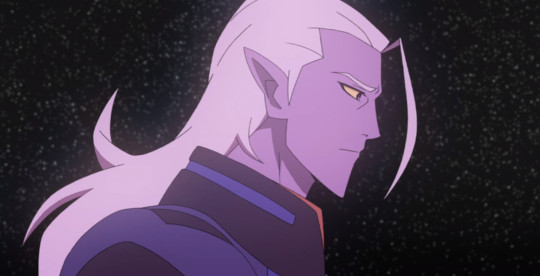
To say that Prince Lotor is a multi-faceted character would be an understatement. Born into a life of tragedy, the many masks he comes to wear are borne of his circumstances to not only further his own agendas undetected but most notably to aid in his own self-preservation both physically and emotionally. A proverbial sword and shield to protect himself. These false faces allow him to do and say what’s necessary to keep himself alive to fight another day - a practice that’s unfortunately hard-wired into him from centuries of abuse.
The character we're first introduced to is probably what the audience expected: an antagonist (albeit a more complex one than expected) that leaves the audience questioning his true motivations. An aspect that makes him more intriguing but also works against him with many fans using it as evidence to validate their worst perceptions of him. But, as we see more of Lotor throughout the series, we begin to explore the depths of him and uncover evidence to the contrary.
So, which is his truest face?
THE MASSES
We don’t get to see Lotor interact with the masses many times in the show, but the most notable occurrences are his introductory scene in the arena and the Kral Zera - both occasions in which he presents himself as a powerful, capable warrior, a persuasive public speaker and a leader worthy of the Galra’s loyalty.
In the first occasion, Lotor almost immediately undermines his previous show of good will towards the assembled Galra by confessing to his generals in private that “the masses are easily manipulated.” This statement would, understandably, leave audience members to believe Lotor is nothing more than a liar and manipulator as a key attribute used to define all of his subsequent actions.
At first glance, this looks pretty damning. Alone, with people we can easily infer he’s closer to, he seemingly reveals that all the magnanimity of his previous words and actions were false and showcase to us a key element of his character to watch out for: an effortless duplicity that is utilized to hide more malicious intentions. At the time, it seems to scream to the audience: ‘don’t trust him’. However, as we learn on his journey, there is more to him that meets the eye, and this line should not be taken at face value.
Before we take this as unwavering proof that he’s a villain and everything that follows should be looked at through the lens of presumed deceit, I think we have to consider the context and audience here. This line was in response to a stadium full of Galra warriors who dutifully and unquestioningly serve his father - someone he’s trying to stop. Swaying the minds of the Galra is a necessary step in his quest to ultimately improve their way of life but he also doesn’t think very highly of them. His regard of them is different than that he holds towards other people and cultures as we see later. I also believe he says this to benefit the generals, but I'll get to them later.
Unfortunately, we don’t get to see him spend time with the members of either of the peoples he looks after, but we do know that he deeply loved his time on the mining planet and there’s no doubt he cared for the Alteans just as much if not more as they were his own people. It’s also not hard to imagine that both groups of people appreciated him just as much. We don’t know how close he truly got to them, but it’s safe to surmise that Lotor is a person that respects others enough to treat them with equality, enjoy working beside them and genuinely wants to improve their lives. Though we later learn that he was ultimately lying to the Alteans, it’s clear that’s definitely not something he enjoys doing.
Among the average civilian or disenfranchised person, we can infer Lotor is more than likely very cordial and respectable based on how he speaks of them and how they perceive him in return. Despite his status as a prince, he’s clearly not preoccupied with maintaining an air of authority among the common folk in any way meant to remind them of his status above them, even allowing himself to bond with people on such an equal level that Zarkon saw it as unfit for his station.
Basically, though we know he has a turbulent relationship with the Galra as a whole, we can also see that he fights for the rights of other half-breeds such as himself and treats people in his care with respect and equality.
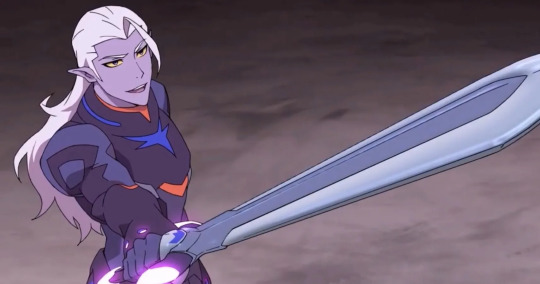
ZARKON
As a child, Lotor had to present himself as the perfect prince in an attempt to earn Zarkon’s love, and it produced a facade he probably maintained most of his life despite it getting him nowhere. Of course, as a child desperately seeking their parent’s affection, this behavior - though tailored specifically to appeal to his father - wasn’t inherently disingenuous and it’s only later in life that he learns to use it as a weapon.
Knowing that Lotor has tried to portray himself as respectable and eager to please thus far, his outburst of anger in retaliation of his father’s demands in 8x02 may have possibly been the first time he’d spoken out against him in such a way as, up to this point, Lotor still seemed to genuinely believe his father would listen to him and is surprised by his decision to destroy the planet. The mask finally slipped but, I might add, only in an attempt to help others. This speaks volumes about the kind of person he is and what his deepest motivations are as it shows he cares more about protecting the mining planet than he does for his own safety as he knowingly incurs the wrath of his violent father. Of course, upon realizing that his interjection would punish them too, he immediately tries to submit himself before Zarkon once more to keep them safe.
Despite his efforts, Lotor unfortunately fails to protect the people and this tragic situation no doubt led him to reinforce the old facade of the obedient son who would never dare act out against his father again - a mask he uses to his advantage in 4x03. After their conversation, we see Lotor smirk suspiciously upon taking his leave, clueing to the audience that his behavior with Zarkon was entirely an act to keep his father from suspecting him of any wrongdoing.
After Zarkon uncovers his ruse, Lotor’s submissive mask drops once more and, upon meeting again, Lotor no longer holds back from sharing every ounce of disdain he bears for his father before fighting him to the death.
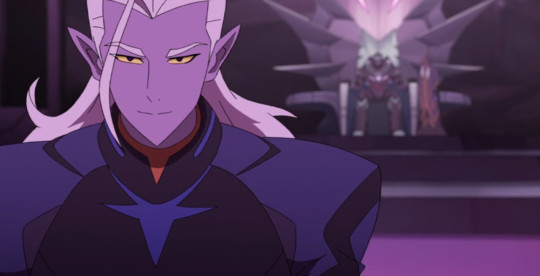
HAGGAR
Unlike his father, where he hides his emotions under a guise of respect and servility initially, Lotor shows no restraint in sharing his unbridled anger and contempt for his mother, Honerva. These feelings never waver, in fact, they only seem to intensify, punctuating a heated final confrontation where Lotor vehemently renounces her as an abomination that he will never accept as family. This distaste seems to have evolved over his life as her role to him changed. As a child, she was nothing more than his father’s witch and not someone he needed to please. Their relationship was never a good one so there’s no need to pretend otherwise.
I believe his anger towards her comes, not only from rebelling against the fact that his mother was essentially stolen from him by Haggar (which shatters his dreams of having a loving mother) but also her mistreatment of him throughout his life and even fundamentally disagreeing with and despising the kind of person she (and Zarkon) are: selfish, power-hungry and uncaring of the lives of others. He denounces them for their behavior because he knows it’s wrong and doesn’t wish to fall prey to it as well - which is a great indicator of the kind of person he is and what values he agrees with and doesn’t.
In a way, this is a true face to Lotor as well. His feelings of unfettered rage towards Honerva are not censored by any mask he’d wish to portray. There is no part to play here as there’s nothing that will keep him safe from her scrutinizing eyes on him at all times. Nothing to hide because there’s nothing to gain from it. So, instead, to keep her off his trail, he goes to great lengths to evade her detection through calculated action rather than any false pretenses.
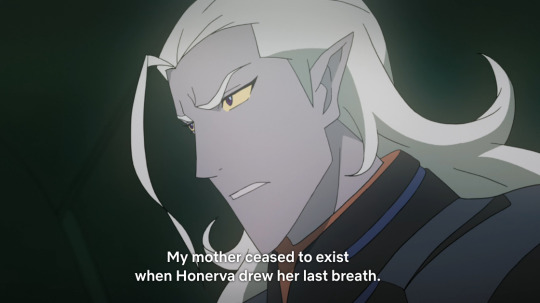
THE GENERALS
Though they’re the closest thing he has to friends for a time, I still don’t personally believe Lotor was close enough to his generals to reveal his true self (though he obviously reveals more to Axca as he trusts her the most). Overall, he still maintains an air of authority with them, seeking to portray himself as the calculating and confident leader clearly stationed above them though he still treats them with respect. Though it’s clear he cares for them, and they hold some degree of respect for him in return, he’s still very much their leader more than their friend. They may believe in him and his mission for a time, but they don’t follow him solely out of admiration and are willing to sell him out if it benefits them - which they do.
They’re, for the most part, his loyal allies, but not anyone he’d confide in or show vulnerability with as demonstrated by his lack of explanation regarding his actions towards Narti and his refusal to share his full plans with them. They respect him for a lot of reasons but don’t entirely understand him or what he truly wants which is why they often seem perplexed by his decisions. With them I think he maintains, to a degree, how he would present himself to the general masses. He has to remain collected and in charge to preserve their loyalty to him and can’t sully that depiction with the perceived weakness that comes from showing vulnerability.
Jumping off my earlier statement about the “masses are easily manipulated” line, it ties into the perpetuation of the persona he’s trying to evoke to them and which they whole heartedly support. He’s telling them what he thinks they want to hear. We also know he doesn’t tell them the full truth, so why should we believe this is somehow some deep reveal into the center of his character when we also know that he doesn’t showcase side of himself with them? It’s another piece of a persona, nothing more.
This mask was not created in an attempt to manipulate but in a desire to achieve and preserve some degree of companionship and loyalty from his generals. Lotor has no one but them and he can’t afford to lose their fealty, so he tries to keep it in the best way he knows how: by being a successful leader worthy of being followed.
Bottom line, beyond Lotor’s genuine affection for his generals - which is very much an extension of the compassion he’s capable of - he does not show his true self with them.
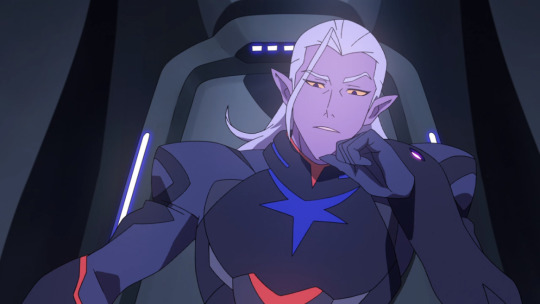
THE PALADINS
Lotor sustains his typical air of confidence upon meeting the paladins face to face in a continuous effort to portray himself as a worthy asset to them (not too dissimilar from his interactions with his generals). Though he shares vital intel with them to prove his loyalty to their shared goals for peace, he doesn’t go out of his way to ingratiate himself to them. He’s cordial and honest, as is generally his nature, but not afraid to share his opinions even if they’re opposing or adversarial.
For example, in their first scene together Lotor has no trouble calling out Allura for voicing her discrimination towards his race and generally seems tired of waiting for the paladins to truly listen to his advice and start making real strides in the war. He's interested in action, not being liked. If he truly wanted to manipulate them, I imagine he would have been far more sycophantic to worm his way into their good graces - an act he’s familiar with due to his father whom he was trying to lie to. We know what a groveling Lotor looks like and this is not it. Of course, there's also no need to lie to them to get what he wants when they have the same goal.
There’s frustration there between both parties at times and definite growing pains as he finds a place for himself in their group, but certainly not anger or resentment of any kind on his part. That being said, when the paladins do come to trust him and there’s no disagreements in their way, Lotor defaults to his natural state: dignified, helpful and amiable. I’m not sure how much affection Lotor truly manages to garner for the paladins by the end of their time together, but he does refer to them as ‘friends’ at one point and though that doesn’t mean they’re people he would necessarily pour his heart out to, I’d say they definitely count as favored allies that he’d support and protect just like anyone else he cares even remotely about.
However, similar to his generals, whatever degree of fondness he may have developed for the paladins is still ultimately moderated to keep them at arm’s length though, I believe that given the proper time and trust, this could have changed.

ALLURA
With Allura, we see a new, softer side to Lotor. I could write an entire meta solely about their interactions and how they’re not manipulative, but I’ll be brief here. As I said with the paladins, there’s no real evidence to suggest Lotor was just saying and doing everything he did solely to appeal to Allura and ultimately seduce her to his side. Instead, what we see is both of them slowly and organically becoming more comfortable and trusting with each other, enough so that they begin to reveal deeper sides of themselves. Just as Allura is willing to share her insecurities with Lotor, he too divulges the innermost parts of himself that he doesn’t reveal to anyone else.
If a mask is meant to hide the deepest parts of oneself, Lotor being so openly vulnerable, honest and trusting with Allura is enough to tell us that what he shares with her isn’t an act - he’s just finally comfortable enough to show his true face and the hidden parts of himself he hasn’t with anyone else. For a man who is all about survival and whom trust doesn’t come easy, this would be counterproductive and a potential liability he normally wouldn’t risk. So why does he risk it for her?
Relationships are built on trust and that takes time and true understanding to achieve. It takes a great deal of trust to reveal your true self to someone and Lotor simply isn’t at that level with the generals or paladins. He hasn’t really had anyone to share his true self with until Allura. He’s never met anyone else like her and their shared history and desires facilitates a swift journey from enemies to friends and even to something greater - an emergence of emotional vulnerability and affection that Lotor has never experienced before: love.
This is an aspect of his identity he’s no doubt unfamiliar with unfortunately or, perhaps, has never truly experienced before in his countless years of being whatever he had to be to survive. As we’re discovering this version of Lotor, he may also be discovering himself too.
There’s so much I could say about their relationship and how it brings out the best in both of them, but I won’t go off on a tangent here. Needless to say, the reason Lotor feels so different in S5-6 is because interacting with Allura is finally giving us the opportunity to see new aspects of his identity that’s open and unguarded. He’s finally put down his sword and shield... which leaves him vulnerable to attack.
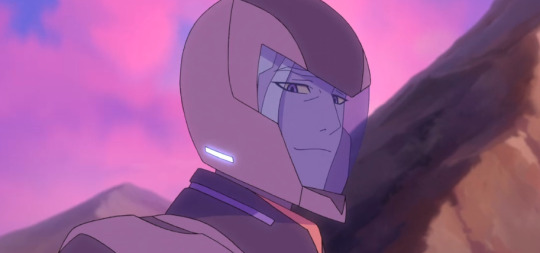
QUINTESSENCE POISONING
I want to address this specifically in its own meta but, for now, I’ll say that I found this depiction of Lotor a betrayal of the character and purposefully over-exaggerated to compensate for and push a narrative the writers failed to achieve organically. Essentially, I believe they made him so villainous - so vile despite how out of character it feels - simply to validate this new agenda that he is and always was, in fact, that very villain and, if that was always their intention for the character, they did not succeed.
Though we know that quintessence can corrupt and see that firsthand in how it turned his parents into beings acting without remorse and motivated purely by evil-intentions, even they have never been shown in such a negative and manic light, making Lotor look even more deleterious here by comparison which is an... interesting choice.
That being said, the turbulent emotions presented here do stem from underlying trauma, namely the pain of being betrayed by the one person he trusted more than anyone. The one person he showed his true face to. The person he loved. Having his true feelings be rejected and touted as nothing but more lies and deception as someone who doesn’t share them idly would be beyond devastating. Now, having put down his shield for Allura, she’s struck at the very heart of him. The pain of it unleashes a tidal wave of emotion and, like a wounded, cornered animal, he lashes out. This creates a situation which we see a side of Lotor we haven’t before. One that, though borne of genuine emotional suffering, does not actually reflect who he truly is.
Exacerbated by his exposure to the quintessence field and perhaps even that which already resides in his blood, Lotor reveals intentions of great evil - last minute motivations stemming from deeply rooted fears and insecurities that, unfortunately, are pulled to the surface here in the worst way possible but are not necessarily indicative of him having harbored and planned to enact these darker motives all along. Recoiling from the pain, it makes sense that his natural defense mechanism would be another mask - the ultimate mask.
If this was the true him, he would have truly fooled us all despite the extensive evidence to the contrary, as there is nothing to support his sudden dark desires here but plenty of prior evidence that refutes it despite the writer’s efforts to show otherwise. To say that all of this is the true, final reveal of who he is after all is insulting not only to the character but to fans.
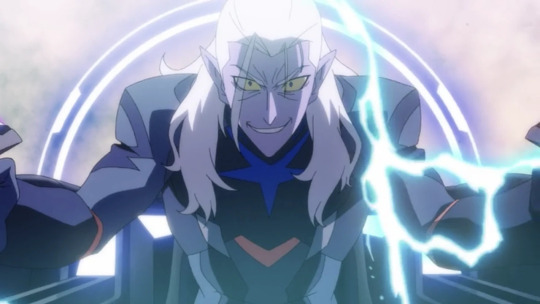
ALONE
To best know who someone truly is, we have to look at who they are when they’re alone. A great example of this is when we see Lotor alone in 4x06 as he overhears a message that there is an on-going attack that will result in mass casualties. Lotor doesn’t hesitate to potentially sacrifice his hard-won freedom to head straight back into Galra territory to try and stop his mother’s heinous plans. This is yet another scenario that showcases that, at the end of the day, Lotor is a character who simply wants to help people no matter the cost to himself.
We also see Lotor alone during his trial on Oriande where upon repeatedly being attacked by the White Lion, he understandably goes on the offensive and fights back to protect himself. After failing this test, Lotor is devastated. Rather than revealing any clues to potential villainy, this interaction instead simply shows that Lotor still has things to unlearn and is aware of that and capable of change. His anger here comes from his desperation and desires for self-preservation upon being attacked, not from a place of genuine malice.
I think it’s also worth noting Lotor’s expressions when he’s in his cockpit throughout the show but especially during his fight with Allura right before his ‘turn’. No one else can see his face but the audience so there’s no one to appeal to. No act to put on. We can clearly see he’s upset and remorseful and it feels like a sudden reversal from his previous scene with the generals because it is - not because his pleading with Allura is an act - but because his talk with his generals was. They are understandably confused here because his recent speech to them would have them believe he didn’t truly care about Allura and was just using her the whole time. This display says otherwise.
To further emphasize this point, his words and expressions here are consistent with his attempts to appeal to Allura in 6x04. The fact that his interaction with her is the same - whether he’s alone or in public - also shows us that it’s genuine. He doesn’t hesitate to share his true feelings to her when he’s trying to defend himself, nor does he bar his words in front of the paladins and generals when he’s trying to talk her down later. They might as well be speaking in private because it wouldn’t change his reaction. He’s completely focused on her and unconcerned with his unencumbered feelings being on public display - something he’s never done before and obviously wouldn’t be comfortable with. All of this continues to prove that, when it comes to Allura, he is his authentic self and his feelings for her are indeed true.
There may be more significant instances of seeing Lotor alone that I can’t recall, but, in summary, if Lotor was truly an evil, selfish person, we’d see hints of that most clearly in the instances where he has nothing to hide.
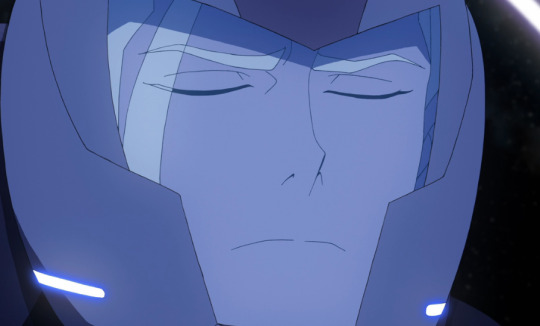
CONCLUSION
So, what is Lotor’s true face then?
As I’ve stated, Lotor is a man who has had to adopt different personas to survive, and we get to see the multi-faceted nature of his character on full display throughout the series depending on who he’s with and in what context. Regardless of some blunders in writing, overall, I think the show did a decent job portraying the different sides of him that would have logically emerged given his unique life and circumstances.
Of course, seeing the ease and skill in which Lotor can slip on these masks would naturally leave audiences to continually question him and his true intentions. As the show reveals more and more of his true self however, the answer becomes increasingly clear that, despite the resulting duplicity of his nature, there is no evidence to support that he's anyone other than someone who wanted to do exactly what he said he did and whose goals are ultimately to help and protect others - a desire which was shown through his words and actions on multiple occasions. For all his faults, Lotor does have genuinely heroic traits despite being raised in an environment that didn’t cultivate them. A flower struggling to bloom in spite of the aridity of the soil in which he was born.
Despite the intended desire to hide his true self for his own protection, these fabricated facades do inadvertently reflect shades of his inner self too - a kernel of truth buried in each even as he has to transform to become what he thinks he needs to be to survive. By default, he tends to hide his true emotions underneath a facade of control and confidence - most notably seen in his interaction with the generals, the paladins initially and the masses (mostly Galrans). This portrayal of the proud and cunning man however is just a front to hide someone underneath who is more concerned with knowledge than power and protection rather than violence and it’s his bond with Allura that reveals the truest face of all: someone who is genuinely capable of kindness, vulnerability and even love. Given the right time and treatment, the inherent goodness in him could have been allowed to flourish and win and his true face could have been the last one we saw him with...
#voltron#lotor#prince lotor#vld lotor#vld#v:ld#voltron: legendary defender#voltron legendary defender#voltron meta#lotor meta#vld meta#voltron analysis#vld analysis#allura#lotura#princess allura#zarkon#honerva#haggar#no4forLotor
178 notes
·
View notes
Text
Inverted Mirror: A Discussion of Shiro & Sendak’s S7 Fight Scene
Back before Season 8 came out, I wrote at least one meta on my @fandomoverflow sideblog about the fight between Shiro and Sendak in response to seeing the constant hate being directed at the writers because people saw Keith being the one to kill Sendak as undermining Shiro’s recovery from the trauma of his time in the Empire’s prisons.
The original post has since been deleted and only exists as reblogs, because this was back before tumblr’s porn ban opened my eyes to the importance of archiving and preserving fandom activity. But after I decided to put together a masterpost of all the meta I’ve written, I figured that I would try to write my thoughts out again to reflect on my understanding of that scene years later and see how my thoughts now compare to my thoughts then.
And one thing that I still feel very strongly about even after all this time is that complaints about Shiro not getting to be the one to kill Sendak overlook the symmetry their fight in Season 7 has with their previous duel back in Season 1, and the significance of what that all represents in terms of Shiro’s character arc and the show’s themes.
In their first fight back in Season 1, Shiro and Sendak are evenly matched. It ends in a stalemate with neither able to back down without the other killing them, but also unable to strike without being killed themselves. Sendak’s victory in that fight only comes from Haxus intervening and taking Lance hostage, distracting Shiro long enough for Sendak to knock him unconscious.
In their season 7 fight, Shiro and Sendak are still evenly matched, and Sendak only gets the upper hand when his ship crashes on Earth’s surface. But Keith’s arrival in the Black Lion turns the tide and ends Sendak before he can kill Shiro.
The common pattern here is that both times they fight, Shiro and Sendak are evenly matched. The only time one is able to get the upper hand over the other is when outside circumstances interfere, whether it be the environment they’re fighting in, or the presence of their allies.
And it’s specifically the question of whose allies are present that determines the outcome of each of their battles. Shiro faced Sendak alone without backup in Season 1 and lost because Sendak brought reinforcements. In Season 7, Shiro has the rest of his team ready to swoop in and help, while Sendak is the one fighting alone.
It’s a demonstration of the show’s emphasis on teamwork and working together that has been hammered in from the very first episode of the series. When Shiro and Sendak fight, the one that fights alone is the one that loses, while the one who fights with the support of others is victorious.
And it also serves as an encapsulation of Shiro’s character arc that I observed in one of my previous meta a few months after Season 8: that Shiro started the series trying to deal with his problems alone without relying on anyone, and that he had to learn to admit his vulnerabilities and accept help from others. The point of his arc, like I said in that earlier essay, was a rejection of the mentality that someone is weak for needing help to deal with their problems, both physical and mental.
So having Keith be the one to kill Sendak when Shiro is cornered after the ship crashes serves as a visual embodiment of that message: that Shiro doesn’t have to face his demons alone.
Which is further supported by the fact that the series has already established a consistent track record of Keith saving Shiro.
First in Season 2 when he flew the Black Lion for the first time to rescue Shiro from the angry wildlife of the planet they crash landed on.
Then again in Season 3 when he rescued Clone Shiro as he was about to die from lack of oxygen and supplies in his stolen Galra fighter.
And finally in Season 6 when he refuses to let clone!Shiro fall even to save himself.
Even outside of life-threatening situations, Keith has always been willing to jump in when Shiro needs help:
During the paladins’ very first training exercise in S1E02 “Some Assembly Required”, Shiro freezes up at the sight of the Altean gladiator charging towards him and Keith doesn’t hesitate to throw himself in front of Shiro and block the gladiator’s blow.
So Keith killing Sendak rather than Shiro doing it is the culmination of this pattern the series has been building up from the very first season (barring any moments in Season 8 that were cut due to WEP’s meddling of the final season).
Part of the reason I think people reacted so negatively back in 2018 to Keith dealing the final blow to Sendak instead of Shiro is that they were expecting the story to resolve Shiro’s trauma with a big, cathartic confrontation with the major figures of the Galra Empire responsible for his pain. Something like Zuko facing his father during the Day of Black Sun in Avatar.
But even if that was the kind of story the writers had been planning on for Shiro and his PTSD, Sendak would not have been the Ozai in this analogy.
Back when Season 7 first came out, I saw a lot of fans at the time acting like Sendak was a major source of pain and trauma for Shiro because of the scene where Shiro has a panic attack while Sendak’s memories are being downloaded in Crystal Venom.
But when you look at the details that the show gives us about Shiro’s experiences as a prisoner of the Galra Empire, Sendak actually has very little to do with the trauma associated with Shiro’s time in the arena.
Sendak was never once shown or mentioned as being part of any of Shiro’s memories of his time in the arena, and when they meet face to face in “Fall of the Castle of Lions”, their reactions are distant and impersonal.
There’s no recognition of each other as anything other than a Paladin of Voltron and a General of the Galra Empire.
And before the fight even begins, Shiro takes a defensive position, waiting for Sendak to make the first move.
When Shiro is captured, Sendak does mention being impressed that Shiro managed to escape and wanting to see if the rest of humanity had his spirit, but this only really indicates that Sendak was aware of Shiro’s performance in the arena.
It doesn’t confirm any deeper knowledge of what happened to Shiro beyond what we already learned. Especially because his reaction to Shiro’s prosthetic arm during their fight shows that he didn’t know about it. Which indicates that Sendak was not directly involved in what Shiro endured.
And the scene where Shiro hears Sendak’s in the memory chamber during “Crystal Venom” is directly indicated to have been Alfor’s corrupted AI giving voice to Shiro’s private fears and insecurities, as Lance’s experience with the airlock earlier in the episode established that the corrupted AI could mimic the voices of other people such as Coran.
So while Sendak may have been the instrument the castle used to trigger a panic attack, the details of Shiro’s backstory don’t support him playing any significant role in the horrors Shiro endured beyond that of a spectator in the arena.
This contrasts with his reaction to seeing one of the people directly involved in his torture and modifications when Haggar confronts him aboard Zarkon’s command ship in S1E11 “The Black Paladin.” His immediate reaction to seeing her is to angrily growl out “you”, demonstrating that he knows exactly who she is. And then almost immediately he goes on the offensive.
Haggar was directly responsible for everything that happened to him and has a deep knowledge of things even he didn’t know, based on the fact that she announces her presence by referring to him by the name his fellow prisoners gave him. Unlike with Sendak, Haggar is personally invested in fighting Shiro and tormenting him for his lack of gratitude to her for “making him strong.”
So just in terms of the volume of information we have about each character’s relationship to Shiro, the character built up as the biggest source of trauma for Shiro in regards to his time in captivity was not Sendak, but Haggar.
If the narrative had been meant to build up to Shiro personally winning a battle against a major source of his trauma (and I won’t rule out the possibility that this might have been one more thing carved out of the final season by Bob Koplar’s meddling) like how Zuko fully broke free of his father’s influence by confronting Ozai during the eclipse, the Ozai in that scenario would be Honerva, not Sendak.
Especially because Honerva was the one directly controlling his clone self in the second half of Season 6 and forced him to turn against his team.
If Sendak was meant to correspond to any character in this ATLA metaphor, it would be Admiral Zhao.
Who, if you recall, was also finished off by outside interference during his rematch with Zuko during “The Siege of the North Part 2” when the Ocean Spirit dragged him into the Spirit World. And I don’t hear people arguing that Zuko was robbed of closure because he didn’t get to beat Zhao again.
But even outside of that comparison, Sendak actually does fit as the Zhao of Voltron in terms of their roles in their respective narratives.
Zuko and Iroh are our first Fire Nation antagonists, but we quickly learn that they are banished and are not representative of the Fire Nation military capabilities. Zhao, on the other hand, is Team Avatar’s first look at an actual military leader of the Fire Nation who directly opposes them..
Similarly, while we get brief glimpses of Zarkon throughout the pilot, Sendak is the first actual military leader of the Galra Empire who comes into direct, face-to-face conflict with our main characters. And by the time the Paladins return to Earth in Season 7, he and his Fire of Purification are all that’s left of it.
Galra civilization as seen in Season 8 was reduced to scattered colonies living on isolated planets, trying to stay alive while salvaging what they could from the remnants of the empire’s infrastructure. With the throne empty after Lotor was left in the Quintessence Field and Honerva killing pretty much all the potential claimants at the Kral Zera during the timeskip, the Galra Empire ceased to exist as a political and military entity by the time the Paladins returned to Earth in Season 7.
The only people left who were shown to still be loyal to Zarkon’s ideology that the empire stood for are Sendak and his Fire of Purification.
So by killing Sendak to help Shiro, Keith symbolically fulfills his own words from when he tried to kill Zarkon back in “The Black Paladin”:

“This is my chance to put an end to the Galra Empire. I have to take it”
But as I said, a big Zuko vs Ozai moment does not appear to have been the approach that the Voltron writers were taking with Shiro’s PTSD.
His arc, like I said back in 2019, was about learning to rely on his team and accept that needing help from others did not make him weak.
So contrary to what people were saying back when Season 7 dropped, Keith saving him from Sendak did not undermine his arc, but was (at least part of) its culmination.
TL;DR:
I don’t if this attitude is still common this attitude in 2022, but a lot of people post-Season 7 were insisting that Shiro should have been the one to kill Sendak, and years later that take still annoys me because it misses the point of Shiro’s character arc, exaggerates Sendak’s importance to said arc, and dismisses the multiple layers of symbolism and meaning in having Keith deal the final blow.
#voltron meta#vld keith#takashi shirogane#vld sendak#voltron analysis#redoing an old meta that no longer exists
23 notes
·
View notes
Text
thinking about klance.
keith who is always left behind and abandoned, either voluntarily or not. keith who has trouble trusting people and talking to people and getting along with people and-…keith having trouble with people in general. keith who is used to fending for himself and not relying on anyone bc the two (2) times he’s done that, his parents and shiro (died, left, disappeared), didn’t end well. keith who despite finding shiro again couldn’t help the gap forming between them as his brain and heart insist that something will happen again and shiro being here isn’t permanent. keith being proven right in season 2/3 and being left alone again.
lance who is SO trusting that he comes across as a bit naive. lance who worked hard to get where he is, who studied and practiced day and night to be at the top of the class. lance who always fell short and just missed the cut and ended up a cargo pilot. lance who only excelled once keith was gone but was stuck living in his shadow. despite the fact that iverson was mean to keith, keith was his favorite student and iverson always held a grudge for lance taking his place and was downright cruel to him at times. lance who started a rivalry w keith in his head bc he was determined to prove that he could be better than keith. lance who was moved from blue to red paladin, following after keith yet again. lance who worked hard to prove that he was worthy of being red paladin but always failing bc he was never keith, he was never good enough.
klance who found what they lacked in each other. lance who was there for keith when it seemed like the universe was crumbling down around him. lance who stood by keith’s side and told him what he needed to hear, supporting him being leader and helping lead the team together. keith seeing lance as an equal and relying on him the way lance relied on him. keith who was loved and supported by someone who never left, lance who was seen for who he was and who never doubted him or his place on the team. klance who turned on each other.
keith who turned into what he hated and leaving lance behind. lance who saw keith as weak and selfish for leaving him the team behind. keith who came back to a lance who was so angry and upset, but who never left his side bc lance was just Like That. lance who was so hurt and upset, who said cruel things in the vacuum of space, but keith never saw him as less for it, who never got angry enough to hurt lance back.
at the end of everything, lance searching for keith to sit at his side as they watched the sunset bc lance will always be at keith’s side. keith who told lance how relieved he was and hopeful bc he knows what lance is capable of and how much he needs him. klance being what the other needs, holding each other’s heart in their hands but never taking the opportunities to crush each other. lance who never left keith behind, keith who never saw lance as less despite the vitriol he spat at times.
#soulmates#idk if i articulated my thought well enough#but it is what it is#i just wanted to get this down#they are exactly what the other needs#they could be each others downfall but they love each other too much to do so#lance who could prove to keith that his mind is right - that keith is doomed to be alone. that everyone will always leave him.#keith who could prove to lance that his mind is right - that lance will NEVER be good enough for anyone. that hes unworthy of veneration#klance who could utterly destroy one another and have enough reason to but never doing so#theyre on like a dangerous precipace but their love for one another is enough to keep them from falling to their doom#does this make them two sides of the same coin? kinda right?#lance mcclain#keith kogane#klance#vld#voltron#voltron legendary defender#chracter analysis#does this make sense#angst#klangst#but also not#but also yes#keith angst#lance angst
276 notes
·
View notes
Text
Tis a niche of its own
Sorry there is only two female characters, I kinda pulled these off the top of my head and probably missed a ton of other candidates. Reblog with an addition if you have one!
Edit: I forgot to make this poll a week long! Once this poll ends I'll remake it with new additions depending on the results (the characters with the fewest results will be replaced with suggested characters from the notes so be sure to suggest some!) in the meantime tho plz reblog to increase sample size
This follows my own definition of what "Comic Relief" means: A character that is used as a conduit for comedy in a piece of media
Through character studies I have determined that there are 5 types of comic relief: the Character Relief, the Audience Relief, the Tone Shifter, the Butt of the Joke, and the Slapstick. Characters that identify as "Comic Relief" usually fall into one or more of these categories
Further explanation under the cut
The Character Relief refers to a character who actively makes jokes to be funny in-universe through conscious humor. Examples from this poll would be Sans and Rayla, who go out of their way to make their friends laugh
The Audience Relief refers to a character who makes the audience laugh regardless of their impact on the story. Examples from this poll would be Lapis and Gus, who are often involved in comedic bits meant for audience entertainment that aren't acknowledged by the narrative as anything unprecedented
The Tone Shifter refers to a character who makes jokes to relieve tension and shift the tone of a scene, either consciously or unconsciously. Examples from this poll would be Jay and Leo, as they both consciously make jokes about grim situations to help their friends or family feel better. Additionally, Jay would do this unconsciously before his trauma made him start doing it on purpose
The Butt of the Joke refers to a character who is made fun of by other characters in-universe, whether endearingly or not. Examples from this poll would be Dewey and Lance, who are often met with insults whenever they do something wrong or silly. The insults are usually meant to be endearing and comedic, but they can still feed into the character's possible inferiority complex. This also applies whenever a villain hits them with a sick burn*
The Slapstick refers to a character who is made fun of by the narrative and the audience like a punching bag. Examples from this poll would be Sokka and Yusuke, who are sometimes put in troubling and awkward situations as a gag for the audience's entertainment alone. These gags are not fun for the characters yet delightful to watch
Most comic relief characters can be characterized as multiples of these. For example, Jar-Jar from Star Wars is both Slapstick and Audience Relief, and even if you don't find his jokes funny that doesn't change the fact that they were written with your entertainment in mind
If you're curious how a "The Narrative's Favorite (derogatory)" character would fit into this chart, they're likely both a Butt of the Joke and a Slapstick character, making their life absolute hell. To be honest, MK from Monkie Kid is an example of a character who fits all 5 categories, but he isn't blue so he isn't in this poll
*Ok if you've ever seen Phineas and Ferb Mission Marvel let me just say MODOK is a total Butt of the Joke and my favorite line in that special is when a TV announcer calls him a "Giant Chicken Egg with a Face" and I just had to mention that omg
#I wanted to put Aqua from Kingdom Hearts but she's technically not a comic relief character#I did initially put Phoenix Wright down but ultimately decided Lapis needed a shoutout#Phoenix is both Butt of the Joke and Slapstick. no wonder he's traumatized#polls#comic relief#character analysis#atla#atla sokka#ninjago#jay walker#voltron#vld lance#ducktales#dewey duck#sonic the hedgehog#the owl house#gus porter#undertale#sans undertale#the dragon prince#tdp rayla#persona 5#yusuke kitagawa#rottmnt#rottmnt leo#steven universe#lapis lazuli#ok ko#ok ko let's be heroes#omg im out of tags
182 notes
·
View notes
Text
Remember how pretty much everyone would shame Lance for being a cargo pilot and “only getting bumped up to fighter class because Keith washed out”
I feel like something everyone seems to forget or even just straight up ignore or not even acknowledge is that Keith washed out and Lance was the one to get bumped up to fighter class meaning that he was good enough to be added to fighter class. Like, at least from my understanding, if there had been more spots available in fighter class he would have made the cut. Yea he wasn’t picked initially but that doesn’t mean he wasn’t still good. To me, it sounds like he was on a kind of waiting list, y’know, like if a spot opened up it would be his, aka literally what happened.
They were all shaming him for not making the final cut initially but he was still bumped up as soon as there was an opening. I firmly believe that the reasons for his ‘poor flying’ was insecurity and self consciousness. We were shown some of his insecurities and one of them was not being good enough as a paladin(/pilot) and I wholly believe that was even stronger at the Garrison since everyone was always shaming him and pointing out any kind of shortcomings. Lance was a good pilot(/paladin) but he was made to not believe it, and I think that reflected in his actions.
If he had received actual affirmations and positive feedback I think he would have done better in the simulator and his initial flying of the Blue Lion. Let’s not forget how quickly he was able to adapt to Red’s controls. While, yes, he had trouble at first, that was just because it was different from what he was used to. But he managed to get the hang of it relatively quickly.
What was the difference between then and at the Garrison? Positive feedback. He presumably actually got positive affirmations from both his teammates and the Lions and so he actually felt confident in his skills and that reflected on his piloting and actions.
It really shows that he had the skills, he was just too caught up in what everyone was saying about him— to his face, mind you— to actually apply them.
Leave my boy Lancey Lance alone, he got skills and he just needed someone to actually acknowledge and confirm it for him to feel he could apply it.
#voltron#lance mcclain#voltron legendary defender#voltron lance#VLD#vld lance#langst#character analysis#lance had potential#character rant#spiderlily spells
212 notes
·
View notes
Note
One of them got sick and the other was convinced that they’d be immune and kissed them anyway and now they’re both sick together


theyre too sick to be annoying for once. the entire team rejoices.
370 notes
·
View notes
Text
Every time I think about Lance a little too hard I become an irl reenactment of these images

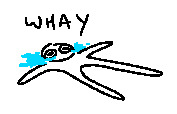

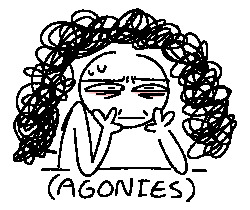
He's a very social butterfly type of character right? And a pretty decent source of comedy/jokes for the group
My adhd headcanon for Lance absolutely comes into play with this btw, I don't have it myself but my friends with adhd say they always felt this obligation to be a social butterfly/jokester to fit in/be "useful" and this fits Lance SO well are you kidding me
Lance is absolutely so smart and talented but he almost definitely doesn't seem to believe in himself nearly as much as he should (a bunch of different things show this, one I can think of rn is when he got insecure over not being called "the sharpshooter" by the other paladins despite his bayard (the weapon that literally changes to the best shape for its paladin) being a gun)
This is also to me why his rivalry with Keith was such a big think at the start of the series (it definitely evolves from that lmao but that's a topic for a different day)
It helps him feel better about himself and his skills when he gets one over on Keith, and thats something he desperately needs (that and Iverson has probably said that spiel about Lance being a fighter pilot as opposed to cargo because Keith flunked out more than once)
Anyway
He makes these jokes and socialises with everyone to be "useful" to the group and to compensate for his perceived lack of ability because sure he may be a bad pilot but if everyone loves him and he's friendly then they're less likely to get rid of him, right?
I mean, seriously, they all get transported to space millions of light years away from earth and his first reaction is to make jokes, act silly and flirt with Allura
Respectfully, that's definitely not his actual reaction? Internally, he is a scared teenager doing anything he can to stay useful to this group of people he probably doesn't really know (maybe excluding Hunk? But even then)
Voltron could have done so much with Lance but instead they made him Allura's love interest and stuck him as a FARMER on altea away from his FAMILY who are so so important to him! Lance has always wanted to be a pilot and losing his identity as a paladin probably hit him HARD because it made him feel worth something to people!!
At the very fucking least Lance would have went with Keith and the blades of marmora, helping people in a new, different way instead and find a way of finding worth without fighting but still helping people and flying through space
Wow that was longer than expected anyway

#vld#voltron#voltron legendary defender#lance mcclain#vld lance#v's thoughts#character analysis#i guess its that? idk man i just have a lot of thought all the time
46 notes
·
View notes
Text
so I want to say, Hunk is like such an underrated character, this guy singlehandedly held the team together in S7 in "The Journey Within" when they were lost in space, and fighting among themselves. Hunk literally was there just mediating between Keith (lets be honest here, it was mostly Keith who caused the fights) and the others.
even when Keith lashed out at Hunk, he was able to reflect on it as Keith being scared, and not being able to deal with it. (which, was true all of them were scared, and why wouldn't they be!? they're fucking floating in space, who wouldn't be scared?)
also, Keith's and Hunk's friendship is so underrated. might ramble more about that.
35 notes
·
View notes
Text
I would like to preface this by saying that I don’t think VLD intended for this nuance to be possible. When they originally made the characters and gave them their lions, I think they made them very one dimensional (hence why everyone’s outfit matched their lion colour), but I think they also started several background plots that drastically changed each character, to the point where they no longer fit the molds they were originally intended to be. That’s why Black Paladin Keith and Red Paladin Lance hit so hard. They were originally assigned lions according to the personality we saw in the first episode, and those personas changed so much and went through so much growth throughout the show that seeing them in their original lions would feel wrong. The change of lion was necessary to their growth as people and that is a fascinating storyline, one that VLD gets zero credit for because they definitely did not intend it (I know because if they did it could have been done way better and with way more nuance). Anyways. I present to you each paladin, what they want, and what they needed but could not get until they grew and accepted themselves.
PALADIN: Shiro
LION HE WANTS: Black
LION HE NEEDS: Green (or, honestly, rest)
Now this is a controversial take. Shiro? The natural born leader? The one who everyone listens to without question? Him? In Green? But hear me out! As much as he exudes an aura of someone who can provide answers, I have to ask — did he ever really, truly, want to be the person everyone relied on? I don’t really think he did.
From what we were shown, Shiro grew up ill. He grew up in a constant state, I would assume, of people telling him that he was incapable of achieving great things. I would imagine this would solidify in his head that he had to achieve great things, or else he would fail himself. I think that’s why he and Adam fought so hard. In an effort to keep Shiro safe (and as someone who may have known Shiro better than he knew himself but was incapable of articulating that in a way that was loving instead of controlling), Adam became one of the many people who told Shiro what he couldn’t do. And Shiro, who was desperate (interestingly, much like Lance) to prove himself, gunned for the position of leadership. And to his credit he performs this leadership exceptionally well! He knows how to comfort and steer people and gain their trust. But at the core of him, I think all Shiro ever wanted to do was explore. Look at his excitement for the Kerberos mission — as much as he, in part, accepted that mission as a show of strength and health, he is a nerd. He wanted to explore and he wanted to explore badly. Even throughout the show, he’s a dorky nerd who gets very excited to learn new things and meet new people. He’s intensely curious, intelligent, and inquisitive, so I think green would be his best fit. (Also, his biology and geology geek ass would love forest powers.)
PALADIN: Keith
LION HE WANTS: Red
LION HE NEEDS: Black
I have talked endlessly about this exact thing before, and I’ll do it again, but this time in more detail.
Keith was struck with a truly heartbreaking amount of trauma in a very short amount of time. He lost everyone he ever loved, quickly, and from what we could see of the flashbacks, his attempts to reach out for help were often met with disdain or even blame. This, I imagine, would paint a very specific picture of life for Keith: it sucks, and it is something that happens to you. Something you can’t control. That’s why he wants to red paladin — since he assumes there’s no control in his life, he acts out, he’s impulsive because he’s been conditioned unfairly to look out only for himself, trust no one for help, and therefore does not often consider or care about the consequences of his actions. With shiro as the black paladin, Keith does not need to offer support as the red paladin, and so in that position he can fully exercise his wild and impulsive tendencies. In fact Shiro was often the one supporting him, and so a lot of his impulses worked out for him. In the red lion he isn’t forced to seek change in himself — at most he is expected to work within a team, which is new, but because of the expectation of his wild tendencies, he doesn’t have to undergo much change.
As the black paladin, Keith is suddenly responsible for everyone else. He can no longer fall back on the idea that he cannot get help from others and he’s the only person he has to worry about. Now, not only is he looked to as the one to make decisions, he actively has to rely on every other person on his team — the black lion is the head, which means it’s held up by the body! Keith is as reliant on his team as they are on him. He now has to carefully weigh almost every single one of his decisions, and untangle the harmful outlook on life that was forced on him. He has to accept that he is not at fault for the trauma he went through, he has to learn how to love and trust. Also, his lack of desire for power makes him a better leader in the long run, because he is less likely to be corrupt because of it.
PALADIN: Lance
LION HE WANTS: Black
LION HE NEEDS: Red
As much as Lance does and obviously enjoy being the blue paladin, if he was asked, in the beginning, to choose one, he’d choose black. And we know that’s true because when he had the potential chance to be Black’s paladin, he jumped for it.
It’s because Lance desperately wants people to listen to him. Much like Shiro, Lance — as the youngest sibling and as someone who we saw face so much pointless and even cruel scrutiny — wants to prove himself. He wants to be the best, he wants to be on top, and most of all, he wants to be appreciated for what he offers. Many of his skills are under appreciated, because although he is unbelievably talented in the things he can do, the path life took him on does not place a lot of value on the skills he has. Dance & arts, tension-breaking, long-range fighting — all of these are often considered frivolous and/or expected to be quiet skills. These aren’t things that get praised in the setting of war or battle, and Lance, as someone who is very insecure, needs that praise and validation. As the black paladin his skills and decisions would have a direct impact on the people around him, which would prove an instant validation for him to see, and as the black paladin he would be free from any shadows (like Keith’s).
But, ironically, Lance’s skill aren’t suited for solo leadership, not the way he wants. Lance does have many skills of a leader, that’s true, but that’s why he’s so good at the red paladin — specifically Keith’s red paladin, although so long as he would have the position of right hand man (unlike Keith with Shiro’s leadership, which was very solo) he could work with anyone.
Lance grew up with people. He never knew a time where he was alone. He learnt simply by being alive how to mitigate fights as much as he learnt to escalate them, and how to work with people as much as intentionally upset them. There’s a reason Lance is so good at getting under Keith’s skin, and it’s because he can predict what would make Keith comfortable and is fiery enough to delight in the opposite. Lance can analyze incredibly well, and all of his ideas work best with a partner. He also would have the freedom, as the red paladin, that Keith had — to be as impulsive as he wants to be, but often isn’t, because he’s scared to shake his reputation. Lance, sometimes, visibly wants to go a little apeshit. He likes causing problems. He works well in chaos. But as the blue paladin or the person who is meant to go with the flow, he’s restricted from this desire, and it dampers his ideas and plans. When he’s allowed to think outside the box and move in unexpected ways, he comes up with excellent ideas and puts in new supports that take the team in different directions. Also, by being forced further into Keith’s shadow, he had to learn how to find his light himself, which helped him realize his own worth more than being a leader ever could. If he were to be in Black, he would find himself (due to his worship of Shiro and his lack of faith in himself) in Shiro’s shadow. If he were not forced to find his own worth, it wouldn’t matter which lion he was in, he’d never be able to prove to himself that he was ‘just as good’. By being in Red and as such directly compared to Keith in every aspect, he was able to realize that no, actually, he was individual and that individuality made him strong.
PALADIN: Allura
LION SHE WANTS: Red
LION SHE NEEDS: Yellow
This one was a lot harder to puzzle out.
Allura wants to be her father desperately. She wants to be everything he was. Like Lance, she has placed herself in the shadow of someone she could never be. From what I can tell, Alfor was a very impersonal leader — although he did love and care for his daughter, and presumably his wife, many of his decisions were ruled largely by logic. Allura, on the other hand, is passionate in everything that she does. She loves sparkly things and grand shows and she wants to know everything about everybody and be right in the middle of everything. Alfor wants his people to prosper. Allura wants her people to be happy. You can see Allura’s struggle especially in the beginning — Allura, when trying to emulate her father in her leadership, is kind of a drill sergeant. She is strict and has impossibly high expectations. But when she has the chance to be herself, she is bubbly and kind and excited. She wants the red lion because she wants to be like her father. She wants to hold on to what she has left of him, and is willing to bury herself to do it. She already has a position of unquestioned leadership in the castle, so it’s not necessarily the power she wants, but she doesn’t trust herself to be strong just as she is, so like Keith, she wants the red lion because that’s what’s expected of her.
But Allura likes being right in the middle of things. She likes being the support, likes hearing about people’s lives and doing what she can to help fix problems. She is the definition of a sunshine character, and as the yellow paladin would be able to be as strong as she is soft. Being the yellow paladin would also help her differentiate herself from her father and establish herself as her own person. This would break the heavy burden of expectation she has on her — instead of obsessing over what everyone wants her to be, she can be who she is exactly, and let that be what helps her move forward. The yellow lion would allow her to be as soft and emotional and grieving as she is, without compromising her ability to help guide and support her team and family that mean the world to her.
PALADIN: Hunk
LION HE WANTS: Yellow
LION HE NEEDS: Black
This was a hard one, actually, partially because it does provide some conflict with two people who would best suit Black. Hunk, though, is so versatile that he gets TWO lions that he needs.
LION HE NEEDS: Green
Hunk has a very strange reputation. He’s seen as the sunshine cinnamon roll, which is almost at direct odds with his actual character. Hunk is witty and dry and intensely distrusting. He is the epitome of kind, not nice. He has his suspicions of people and is very fond of his family while also being critical of them, which means that as much as he protects them and cares for them, he’s also willing to protect them from themselves. He’s the one to point out detrimental flaws that others gloss over. He is (mostly) tactful, of course, but he assumes his role as supporter means that he is responsible for pointing out and helping change poor behaviour — which, in fact, is the role of a leader. Hunk also has a very solid view of things in general. He sees situations for what they are and does not struggle to see through smoke and mirrors. He is also capable of being nuanced, even though he prefers things to be black and white. He’s good at taking other peoples feelings into consideration and caring for them while also helping them improve. As the black paladin, he would be able to exercise these abilities in full, as well as utilize his strategic brain to come up with several on-the-fly and reasonable tactical plans.
His surety as a black paladin is directly unlike his role as the yellow paladin, where he often falters due to his anxiety and struggles to be as preppy as he is expected to be. As much as he does like being in the middle of things, he also has a certain need for control, which could be carefully exercised with the black lion. The best way to cure anxiety is to see regular proof that you are capable of overcoming your fears, something that would be obvious in Black. (Also, if Lance were his red paladin, they would be able to utilize their previously established supporting roles and dynamics as leadership ones.)
Alternatively, however, Hunk would work well in the Green Lion. He is just as curious and inquisitive as Shiro and Pidge, although his anxiety and fear of the unknown frequently holds him back from discovery. That’s why he’s so reluctant to trust new people, why he sticks to what he knows. As the green paladin, he’d be the one who’s required to stick his hand out first, the one to mitigate his own anxiety and reckon with the fact that he is not as fallible as he believes he is. He would have to understand that he is capable of things outside of what he’s known to be. It would also help his natural distrust of new people become an intrigue, where instead of assuming new things are threats, he would expect and prepare for the threat while understanding the possibility of progress.
PALADIN: Pidge
LION SHE WANTS: Green
LION SHE NEEDS: Blue
The common theme among each of the original wants and placements is that the paladins force themselves into roles that fit their reputations and expectations. Pidge is no exception. She is curious, and she is inquisitive, but to some degree, that’s all she’s allowed to be. She’s constantly dismissed as a young girl who’s just looking for answers, and so I think that makes her desperate to prove that she’s capable of finding those answers, that she’s the smartest person in the room. In fact it’s when she’s backed into that corner of a one dimensional nerd that she becomes the most volatile. I think she resents that position she’s forced in, and perhaps the time she took over for her brother upset her ability to separate him and the persona she made of herself impersonating him from her real personality, wants, and desires.
But when Pidge is at her strongest, she is thinking about and working towards helping her family. Her greatest and most selfless moments come when she is sacrificing herself to protect those she cares about. Pidge sacrificed her entire identity to find her father and brother, and throughout the show often sacrificed her search for her father and brother to help the universe and the other paladins. Pidge’s greatest shows of strength are when she is protecting, caring, and supporting other people. Also, pidge is incredibly adaptable. Even at her most one dimensional — a coder and programmer — she is constantly hit with huge amounts of obstacles that she must work around on the fly. Most of her young life has been impossibly high hurdles that she’s had to work around. She doesn’t seek those problems out, but rather they are forced upon her, and she uses her resources and intelligence to work with them and eventually overcome them, which speaks more to her adaptability than to her curiosity.
Part of the disappointment in the later seasons of Voltron is that a lot of storylines and character arcs either felt unfinished or mishandled. Part of that is because by prompting so much change in the paladins and then introducing a visible marker of that change in the lion swap, but neglecting to actually flesh out those changes in later seasons, huge parts of the characters felt empty. Shiro was forced to take on a task way bigger than he ever wanted to have — did he ever get the time to find himself and his interests again before he was slapped into a new leadership role and married off? Keith finally seemed to find himself and feel comfortable in his skin as the black paladin — why was he sent away before he could enjoy it? And then why did much of the progress he made while he was away come at the detriment of his ability to co-lead with Lance? Lance had so many interesting arcs and relationships with the rest of the paladins and his own inner turmoil — why were these arcs muddled in the name of a forced romance and settling down on a farm? Allura got to move from an impassive leader to a fun young woman with her entire future ahead of her — why was she forced into a relationship she didn’t want and then killed? Hunk’s entire character was so interesting and funny — why was he immortalized as the caricature he was forced to play in the Coalition show that he hated so deeply, and forbidden from reaching his full potential? Pidge had a fascinating dynamic with the paladins in contrast with her own internal struggles — why was her development dropped as soon as she found her brother?
Dreamworks dropped the ball. But I’m happy to take the seeds they planted and care for them myself — to grow them into a diverse and interesting cast of characters that had deep and nuanced relationships with each other and the situations they were in. Also, I don’t know how to end this essay, so end scene.
#trying smth new!! only the once tho#vld#voltron#shiro#takashi shirogane#keith#keith kogane#lance#lance mcclain#allura#princess allura#hunk#hunk garrett#pidge#pidge holt#adashi#klance#voltron dynamics#essay#analysis#my writing#longpost
334 notes
·
View notes
Note
this isn’t even about my evil agenda anymore I actually just need to hear your dissertation on voltron/klance x first love late spring
you do evil things to my dick and balls. i hope you know that.
first love / late spring is a very keith-core song, but i think it also applies to both keith and lance... but more specifically, FL/LS is keith pre-relationship, and then FL/LS is lance once they have already started dating.
i'm obsessed with that one interview of mitski where she explained that she wrote this song while she was experiencing her vulnerable first love... and first love is vulnerable. you simultaneously reap the rewards of being known but at the same time, you've now let someone else know you, and now you have to trust them to take care of you. and it's so vulnerable. it's more naked than being naked. and it's so difficult as well because now you're learning a brand new way you can be hurt.
so keith, pre-relationship... he's pining for lance and he is MISERABLE. he's lost control! he feels like he's being consumed by the enormity of his feelings. he's eight years old and small and never asked for this, he never wanted to know he could feel this way. he just wants lance to fucking go already. keith wants to spit vitriol and blame and shame and drive lance away so that when lance leaves him (and he will leave him, like everyone else has), then at least it will be on keith's own terms for once. and keith doesn't, he refuses, to say how he feels. he'll spitefully choke on his confession until it suffocates him. he doesn't want to know what lance might say.
but he also is afraid of lance's reaction because... if lance gives him even a sliver of ground, if there's even a promise of a chance -- keith will fold instantly. he will jump into this love headfirst. he'll do anything if it will make lance stay with him.
and then lance, mid-established relationship... things with keith are perfect, everything is going great, so why does lance feel so anxious all the time? why does he feel so scared when keith looks at him like he's his whole world? maybe the problem is lance. because what they have is real. because he's pretty sure keith is it for him. and that terrifies lance. because lance, deep down, knows he's going to screw this up. and it's not just his heart on the line; he's also going to hurt keith.
keith smiles at him and lance feels sick to his stomach. he wants to tell keith that they might be happy right now, but eventually, lance is going to ruin this. he wants to warn keith that lance is going to break his heart one day.
lance isn't always so negative about himself. during the day, it's easy to let himself be buoyed and enveloped by his feelings for keith. he loves being in love with keith. because the love is real. it's real, and it's there, and that matters. but at night, all those poisonous insecurities and anxieties rear their ugly head, and lance finds himself standing on a ledge over a drop. lance daydreams about spending the rest of his life with keith; lance has never felt so young and small.
#mintcaboodle#klance#voltron#ask#the old child/young adult metaphor is also like. so lance-core. AND THE 'I DON'T WANT TO GO HOME' LINE!!!!!!!!#im in my feels tonight i'm sorry the lance analysis is not fully cooked#also like obviously lance doesn't always feel this way. it's more pertinent closer to the beginning when he#starts to fully realize the depths of his feelings and he's freaking out because he's beginning to understand what it means to spend#the rest of your life with someone and that is a TERRIFYING thing to want and imagine when you're only 17/18#lance does get better though and his insecurities die out the longer and more stable his relationship with keith is#though sometimes those same insecurities crop up now and again#i talk a lot about pining keith and how like tumultuous his experience is. but once he starts dating lance things even out for him#whereas lance is relatively chill in his pining and then begins to flounder after they get together and after he's realized the Love word#otp: we are a good team#katiecanons#idk i guess#keith#lance
92 notes
·
View notes
Text
Slowly Going Mad - Part III - Lotor
This is the third installment of my meta series discussing three essential characters of Voltron:Legendary Defender (Zarkon, Honerva and Lotor) and their gradual mental state transitions throughout the show. After writing the first two parts, I’ve debated whether to publish Lotor’s segment or not, due to the emotional triggers this analysis might raise. I decided to go ahead and post it, because I’d love to create a coherent, complete set of essays, but…
We will descend into some sensitive issues (trauma, mental illness) regarding a controversial character, so if you would prefer to steer clear of it, please do so, for your own peace of mind. I know it has been almost five years since the show ended and many of us prefer to leave certain subjects behind. So, if you consider best to scroll past, do so. Hopefully, the warning tags will also provide a firewall around it.

Alright, if you clicked past the stop sign, hop along! And thank you for reading!
The purpose of this analysis is to demonstrate that Lotor’s trajectory towards Season 6 follows a mental illness arc, slowly built up, although the reveal of his backstory arrives to us pretty much… backwards. I will enter into subjects such as developmental psychology, coping mechanisms, transactional analysis (TA) and what it means to reach the dam breaking moment.
His sudden, shocking descent into madness in S6 is achieved through subtle context throughout S3-S6. Couple that context with the backstory dropped in S8 and a larger picture will form. This analysis intends to get granular at times, because the psychology of his path lies in the sum of many details.
Here are a few highlights that define a madness arc:
the originating point of the mental affliction: it can be a defeat, a failure, a loss, grief, a dark influence.
recurrent traumas and/or abuse throughout the character’s life, slowly building up.
the traumas and losses of the past haunt the character.
deterioration of connections with family, friends, community, and finally self. Broken connections lead to paranoia and isolation, which feed the vicious cycle.
as the story progresses, the character’s arc reaches a boiling point.
at this critical point, the individual faces a moment of agency and in a tragic mental breakdown, chooses madness. Whatever breaks the dam is a world-shattering event: extreme grief, total loss of loved ones, closest allies and friends, the breach of trust towards the world, or a combination of these. The character will try to fix the world and/or revenge against the ones who did this.
I’ll approach Lotor’s story the same way I did with the other two: chronologically, which means I’ll jump back and forth among episodes, because Lotor’s backstory is also scrambled across the seasons.
Similar mention as with Honerva and Zarkon’s metas:
1) The distinction between the entity and quintessence. The entity is a creature capable of magical stuff, whereas quintessence is a substance (highest known potency in the universe).
2) Shiro’s statement: “Zarkon fell prey to his own evil instincts. The quintessence field didn’t create them, it revealed them.” - it basically casts the responsibility on the character, not on external factors.
BIRTH AND CHILDHOOD
We’ll begin with the days of Honerva’s pregnancy. I already analyzed these parts in Honerva’s meta, so I’ll summarize. Pregnant Honerva shows distorted cheek marks and visible changing of her appearance: gray, unkempt hair, aged countenance, sagging shoulders. Parallel that to Kova, whose appearance changed after the rift entities attacked, and we deduce that Honerva’s metamorphosis might be due to the same kind of illness.
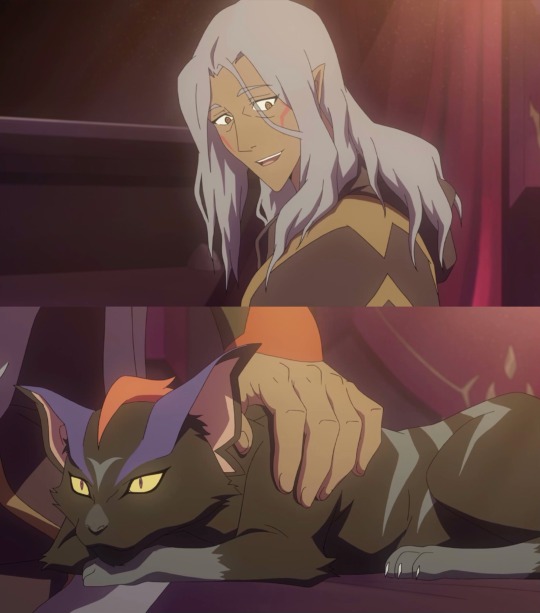
When Honerva falls ill and starts having what seem to be withdrawal symptoms, she demands to go into the rift to get quintessence, because “we must have it” / [we must] “get back into the rift”. The deduction I made was that the entity was actually the one speaking, because - other than the entity - nobody had ever been into the rift before, so “going back” into the rift is something that only the entity could have asked for. Logically, that means Honerva was possessed/infected with the entity.
—————————————————
And this turns our attention to… baby Lotor:
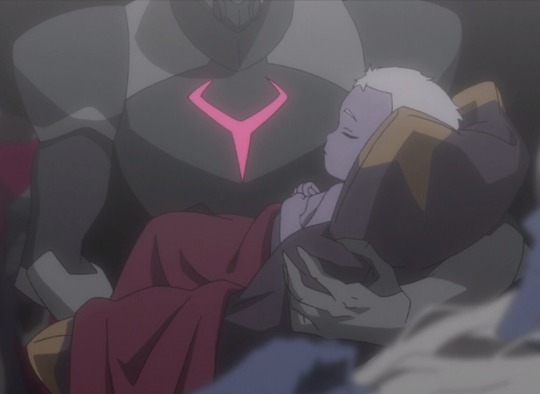
S8E2 “Shadows”: “Sire, the birth was difficult, but successful. Your son is healthy and in good shape, though we seem to be getting some strange readings coming from him directly. Similar to those that, well… Similar to those of the empress and… yourself.”
And voila, I think that makes quite a strong argument that Lotor was born with the entity, which gives him a unique position among other characters. In the same scene, the doctor talks about Honerva’s state: “She only seems to become aware when we administer her quintessence. I’m hopeful her condition will improve with time, but… Sire, we’re gonna have to face the fact that our quintessence supplies are finite. The empire cannot continue to run on what we have. And you, and the Empress, without it… you’ll—”
I’m circling back to Kova, which was also revived only after administering him quintessence, and now it’s clear that these “space vampires” cannot survive without the Q life juice.
Which leads me to an interesting question: did Lotor also need quintessence to survive? The answer seems to lead to a no. For the extended period of time when he stayed in Allura’s castle, either as a prisoner or working together with the Paladins, he did not show any signs of… quintessence withdrawal. As the EPs described him, quintessence is part of his DNA. Without divulging anything about the entity, since this interview took place right after S5, here’s their description (Source: AfterBuzz TV S5 interview - link in comments, since external links here seem to affect the visibility of the post):
JDS: It’s pretty safe to say that Lotor’s got that Daywalker kind of thing going on.
Interviewer: Little Vampire.
LM: Being in…in her womb, as [Honerva] was being exposed to all of this quintessence - it’s part of his DNA. It almost puts him on a level with Allura, pretty much how her quintessence is a part of her DNA. So it’s interesting to see.
Armed with this information, let’s move through the buildup of events that show us Lotor’s backstory, before we see him for the first time in Season 3.
In S8E2, which I’ll quote for a while, because it holds the bulk of Lotor’s early years, we first see baby Lotor right after his birth, rejected by Honerva. Similarly, Zarkon’s paternal instincts are almost abolished. He abruptly orders the doctor: “Take him away.”
The complete lack of empathy for the little nugget gives us just a hint into what this child will go through as he grows up.
——————————————
The next time we meet him, he’s an adorable, tiny school boy, whose stature is below Galra lineage expectations, but as a counterbalance, Dayak points out his remarkable skills and intelligence: he completed the Agotian trials successfully, even though they were advanced for his age. Also, his tactical scores are they highest they’ve ever measured. (Tactical scores, hehe. We know he’s going to become a good tactician later in life; it’s his natural inclination, clearly.)
As Dayak proudly finishes the short account of her pupil, little Lotor speaks up: “All I do, I do in the name of Galra.” I found this little statement quite significant, especially in the context of his education. It comes to show how deep the Galra values are ingrained in his character. It is his pledge of allegiance, something that he must have repeated over and over along his school years. Repetitio est mater studiorum.
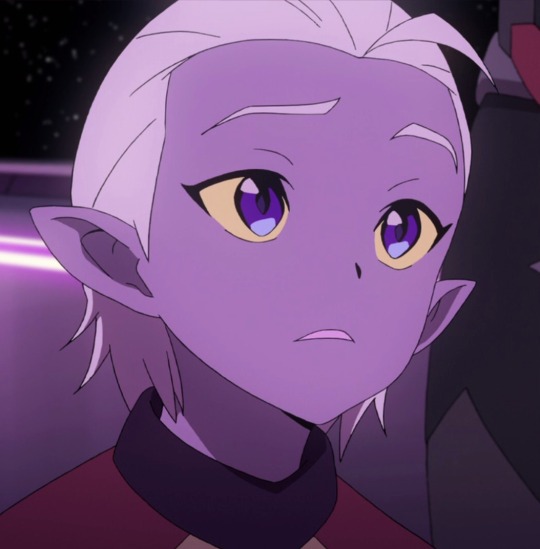
It’s absolutely heartbreaking to see the innocent boy with big, amethyst eyes and a burning desire to connect to his family be coldly dismissed by his own father - an expressionless, emotionless parent who wants to remove his “impurities”, simply because the little boy desires to know more about his mixed race genealogy and he dares to “speak out of his place”. The dynamic between father and son is revelatory not only for the brutality with which the little boy is treated by his own family, but, in contrast, we also get to see the enthusiasm and positive energy exuding from little Lotor, who, despite his father’s lack of empathy and mercy, still holds hope that he can somehow reason with him.
Dayak’s last reply to Zarkon feels painful on many levels: “He will be punished accordingly. We will sear him down to his inner fire so that he may burn the universe.” Whether she wants it or not, Dayak’s crop must inflict pain, lest she loses her job and probably her life.
Let’s shortly bring into focus the apparently hilarious moments between Dayak and Hunk.
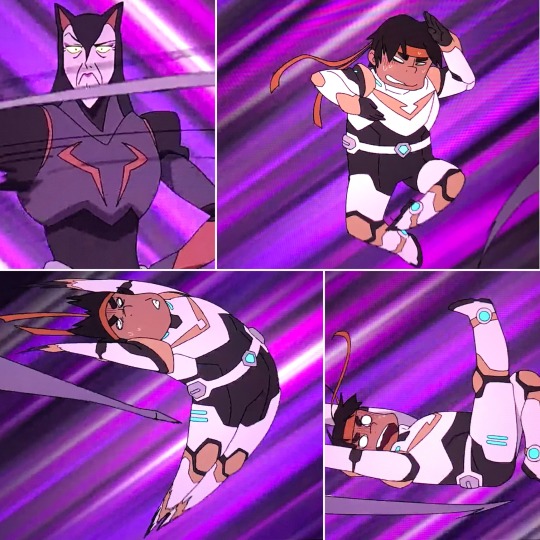
The training is about pain, and what pain teaches an individual. “For the mind to learn, the body must be broken.” Palen-bol, meaning “the enlightening pain”, is the Galran way of learning. “The Galra believe combat is the searing light that burns imperfections of every level, from personal to societal.”
Now, imagine Lotor going through the “enlightening pain”, day by day, year after year, palen-bol after palen-bol. My smile upon seeing Hunk’s comedy soon fades away into a desolate expression. What Hunk basically learns is to contort himself into various unnatural poses, to avoid the painful whips of Dayak. When he finally gets it, she congratulates him: “very good”. In order to avoid the searing pain, he must find creative solutions out, solutions that are not always straight paths. Like a tree that grows distorted shapes in a hostile environment, so does one who lives in constant fear and pain.

TEEN LOTOR
The next significant moment in Lotor’s evolution is somewhere during his early teenage years.
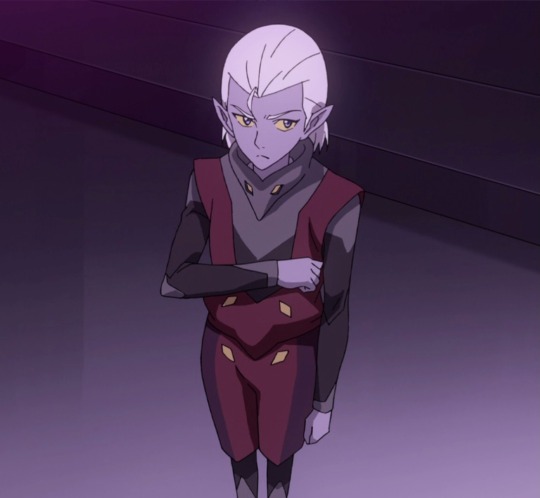
Pay attention to certain verbal repetitions, as Lotor borrows from his father’s language. Also, the Kova scene leads to some interesting conclusions. I’m quoting the entire scene, for better understanding.
Officer: “Sire, your audience is requested in the Kandar wing.”
Lotor: “Father, may I accompany you?”
Zarkon: “You will stay here.”
Lotor: “But I want to join you. I have learned much of our—”
Zarkon: “You are an insolent boy. You may be the prince, but I am your emperor.”
Lotor silently yields, saluting solemnly, but casting a contemptuous look in his wake. After Zarkon has cleared the room, Lotor refocuses on Kova and instantly cheers up. As the boy is leaning over to pet the cat, Haggar suddenly speaks:
“Do not touch him. He will hurt you.”
With a sneer, the boy ignores her. After petting the cat, he asks: “What is his name?”
Haggar: “He has no name.”
Lotor: “Then I shall name it. Your name will be…”
Haggar: “Kova. His name is Kova.”
Lotor, giggling, watching Kova climb over his shoulders: “This creature pleases me. It will be mine.”
Haggar, attempting to protest: “My lord…”
Lotor: “You may be the high priestess, but I am your prince, and you will do as I say. Isn’t that right, Kova?”
Haggar acquiesces: “Yes, my lord.”
So, although years have passed since the scene with Dayak, Lotor is still speaking “out of his place”, which earns him the title of an “insolent boy”.
Despite (most likely) repeated physical punishments along the years, notice how his enthusiasm for life and learning new things is still there, brightly sparkling in his eyes, as he offers to go with his father at important meetings. He is jovial towards his father, as if expecting him to - one day - reciprocate that cordiality, perhaps? This little soul harbors a lot of love and forgiveness, that is for sure!
Despite Zarkon’s stony-hearted reaction towards him, he pouts only as an immediate reflex, but then he cheers himself up by petting Kova.
His impish pout and little frown behind his father’s back foreshadow a future scene - when Zarkon will return to the throne, sending Lotor away. A more refined smirk will cross his face as he’ll depart, hiding behind it a more complex scheme than a teenager’s little mischief, but that scene shall be discussed further when I’ll get to it.
This little detail in child-Lotor’s life is an interesting inflection point that shows us how he learns to conceal his inner thoughts and his ploys from Zarkon, and by extension, from the world (remember the comparison with a distorted tree?). We know that adult Lotor is a master at scheming behind people’s back, working from the shadows, hiding himself - something that even Haggar reproaches him: “You say you rule, yet you stay hidden.” It’s something that he learned over and over again as a kid.
“You may be the high priestess, but I am your prince…” Didn’t Zarkon just utter the same thing? “You may be a prince, but I am your emperor…” Little Lotor learns very fast, his mind is a sponge absorbing everything from his father. With this you can pretty much tell how in awe he still is with him, imitating his vocabulary and trying to emulate his demeanor. The attitude is there: he’s proud of what he’s learned so far, he’s self-confident, and begins to have leadership traits: “you will do as I say.” All he does, he does in the name of Galra…
As for the interaction with Kova, here’s how I see it:
When Haggar says, “Do not touch him. He will hurt you,” I believe the meaning is more than just “Kova will scratch you.” Since Kova and Haggar both are infected with the entity, what are the chances that Kova might possess the same potential of sucking out the life of other living beings?
So in this context, I think that witch Haggar presumes that the prince might get injured. She’s unaware that Kova will not cause him any harm, because… what do you know? Lotor also has a little entity; he was born with it. And Haggar has no clue.
The bond they will form for the next ten thousand years perhaps goes deeper than we think. We know from S8 that Haggar was able to get into the minds of her Altean followers, because she infected them with the entity. There is a telepathic communication that forms, and maybe Lotor and Kova form a similar… mental bond? I’m inclined to believe this theory for several reasons: 1) in S8, Honerva is able to find out Lotor’s location only after probing into Kova’s mind. 2) Narti was also mentally bonded with Kova, and she could see through the cat’s eyes (which stirs the question: did Narti have the entity as well?)
Deep breath.
Are you ready for one of the hardest scenes in VLD?
YOUNG ADULT LOTOR
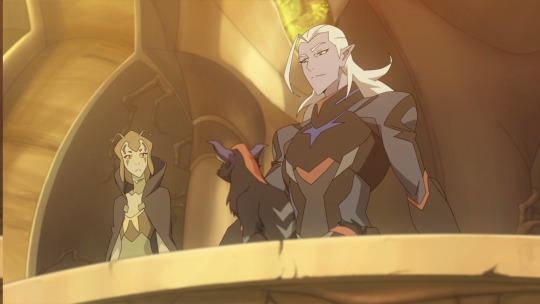
“Are you nervous?” asks Ven’tar.
Lotor replies with a confident, affected voice, looking up and proudly surveying the grand plaza, filled with thousands of people cheering him. “No, Ven’tar. This is my chance to finally make a difference. To show my father what we are capable of.”
Besides the fact that he nonchalantly displays his cat at the edge of his balcony, for the masses to see, notice the expression on his face, his eyebrows. He is pleased with himself, proud of his achievements, proud of the people in front of him.
What he says is also very significant, because it comes to show that Lotor, despite a lifetime of abuse and trauma from his father (and neglect from his mother), still believes there is good in him. He wants to “show” him what he’s capable of.
Oof. The need for validation. Why do people seek validation from others (especially from their family)? You guessed it: mainly because during their childhood, they did not receive enough praise or encouragement.
Overachievers are, oftentimes, love-seeking people who try to compensate for the lack of approval by trying to reach even higher goals, in the hopes of getting the love they need. In that note, here’s what Lotor tells his father:
“Our quintessence yields are some of the highest in the empire, and we’ve been more efficient than any other. By working alongside the denizens of this planet, like Ven’tar here, we’ve outsourced—”
“We’ve outpaced even the most generous projections.”
Poor Lotor!
The most horrific introduction into adulthood is about to drop. The hopeful, optimistic, love-seeking prince will see the true face of his father, and it is not a beautiful one.
We don’t know the details of Lotor’s relationship with Ven’tar, but from the fact that she addresses him without any royal titles, we can infer that they are at least friends. He loves the people of this planet, and he enjoys having her around him, so much so that he actually brings her with him to his father. Meet the parents?
Tragically, his father is utterly offended by Lotor’s introduction to such friends. “You dare work with this pitiful race as if they are your equals? […] The heir to the Galra throne should not sully our honor by working with his subjects!”
Yet Lotor has not learned his lesson yet. He raises his voice at him, like an outraged child that believes there is a way to reason with Zarkon.
Transactional Analysis psychology at its best, this scene provides us with a “game” between the critical, persecuting Parent ego and the rebellious Child ego. Enraged that things are not going his way, but hoping there is still a chance to shake his father from his insensitive state, Lotor takes it up a notch (in a game of “I’ll show him, he’ll see!”):
“It is the way my mother’s people would have done things.”
Lotor knows exactly how sensitive this subject is. All his childhood, he has been banned from researching anything about Honerva. Yet here he is, openly and rebelliously admitting it:
“You thought I couldn’t find out about my own mother? About her people? You thought you destroyed every remnant of Altea, but you cannot unless you destroy your own son as well!”
Lotor is now playing a very dangerous game. What he still does not realize is that his father’s reason is gone, his madness is pushed all the way to the dark side of the spectrum. He bargains with his own life, betting that Zarkon won’t harm him or his subjects. What’s worse, he unwittingly bets an entire planet against his self-assured comments (“unless you destroy your own son as well”). Actually, Zarkon will destroy him too, alongside Ven’tar’s planet. Not physically, but psychologically, he sure does.
“Enough!” Zarkon roars back at him.
Yes, enough, because it’s unbearable for Zarkon to even go there. The madness that clouds his mind has abolished any rational Adult from the picture. There is only the Tyrant, and he’s made up his mind.
“You are to crush this planet beneath your heel!”
The rebel child fights back: “Never!!”
Zarkon’s answer completely takes Lotor aback: “Then I will!”
Lotor is still in denial. The most cruel, dark, ugly face of his father is finally revealed to him and he cannot fathom it out. His father is truly capable of the most abominable acts.
Incredulity and desperation drips from his lips: “You wouldn’t. You can’t! Father, wait!”
Father, wait… Maybe, maybe he can fix this… Maybe he can soften his heart with one last plea, maybe he can twist himself one more time to his father’s will, if only he could to save his beloved planet:
“No, please do not do this, Father. Do not make these people suffer for my actions.”
The rebellious child shrinks into a penitent little being who bends to his abusive parent. How can he save them, now, in the last moment?
Alas… “It is already done.”
“I will do as you ask. The people will serve the Galra.” He will bend, he will bow to his father’s will, he will endure once more the whipping and palen-bols, he would do anything to save them! (Isn’t just this scene enough to reveal Lotor’s true character?) Utterly desperate, he runs after him, begging.
But we all know how it all went down...
Waking up to face the image of utter destruction, the fire outside reflects the scorching pain and horror inside him.
“You are hereby banished from the empire. Forced to live out the remainder of your days remembering your failure here.”
Indeed he will remember it for his entire life. After thousands of years, it will be his first and only confession to Allura, spoken, of all places, at Oriande, the most beautiful, celestial site in the universe.
“Have you nothing to say, witch? Surely even you can see the folly of your master’s actions,” utters Lotor through gnashing teeth, back at Haggar, who watches him impassively.
After a tragedy of this magnitude, I’m quite sure many would lose their mind. How did Lotor find the strength to go on after this? How did he preserve his sanity? Or maybe he actually… didn’t?
—————————————
We know a little bit about Lotor’s life in between this event and the first time we actually meet him, in S3E1, in the gladiator arena. From what he told Allura, after the harrowing event on Ven’tar’s planet, he spent the next few centuries searching for clues about his Altean heritage. We also assume it was within that time frame when he gathered the Alteans scattered across the corners of the empire, and brought them to the hidden colony in the Quantum Abyss.
But why his Altean heritage, you ask? He could have simply tried to find his inner peace in other ways… like, I don’t know, let’s say meditating, getting mental treatment, finding an occupation that would give him a different purpose. No, he spent centuries diving into the lost history of Altea, “another culture destroyed by Zarkon.” This was the only occupation that could give meaning and purpose to his life.
Why Altea?
Because it was the culture of his mother, whom he idolized. So much so that he defied his father’s interdictions and followed the Altean customs when ruling Ven’tar’s planet. So much so that when Allura dares to suggest that Haggar might be his mother, he snaps at her.
A child rejected by his father, mistreated, beaten, abused, tries to find refuge and comfort at the bosom of his… mother.
After Zarkon destroyed his heart, Lotor ran straight into the arms of Mother Altea. I believe that as much as the lost Alteans needed him to provide them a safe refuge, he needed them even more. He needed them as a child would need a mother to turn to, a safe place where he could heal his wounds.
I think herein lies the key to understanding Lotor’s mental trajectory and giving a true meaning to his mental breakdown and to the words he utters during the S6 tragic events, as I’ll discuss when we’ll arrive there.
Take a few deep breaths. Stretch your legs.
ADULT LOTOR BEFORE ALLYING WITH VOLTRON
Let’s see what he’s up to, thousands of years after all is said and done, during the new Paladins’ era. Haggar summons him to return as pro tem, and we first meet him in the gladiator arena.
We learn a bit about him from the little gossip murmured between Throk and his crony, watching the show. The “exiled brat”, how they call him, likes to “fight alongside his enlisted men, like a lowly private.”
“Worse than that, his top generals aren’t even pure Galra. They’re half-breeds at best. He has no honor,” Throk continues.
“Some say he allows the planets he conquers to continue to rule themselves. Can you imagine?”
“Clearly he’s a dangerous lunatic.”
This is the general atmosphere in which Lotor enters as emperor pro-tem, but now we know what kind of “lunatic” we are meeting.
His combat skills show his great talent for evasive maneuvers, using the opponent’s size to his advantage. He has adapted perfectly to the hostile environment in which he grew up. Like Hunk learned to avoid Dayak’s stinging crop, Lotor masters the art of evasive maneuvers to the tiniest detail. He easily defeats the big guy, then, with a theatrical gesture, reveals Throk’s hidden agenda to the public (courtesy of Ezor spying around - so we also know he’s got some good tactics to stay ahead of the game).

During his fight with Throk, Lotor makes some interesting remarks:
“You have flawless technique, that I’ll grant you. Still, you must realize at some point, that your repetitive attacks are getting you nowhere.”
“Your tactics are stale. And in the end, your own aggression is your undoing.”
The easy win that Throk provides, along with the dramatic effect it has for the audience, gives Lotor the perfect opportunity to win the public’s heart, by sparing Throk’s life. A novel approach.
“My father built our Empire on the bones of his enemies. But the time has come to change the old ways, and inspire not fear from those we rule, but loyalty. We must not waste our energy fighting to keep our subjects down, but rather multiply it, by allowing those worthy to rise and join our ranks. The Universe can no longer doubt our strength. Each ally gained only makes us stronger, while those who continue to stand against us… will be crushed.”
Wise words of a visionary man with a progressive agenda, he seeks to dislodge the old ways of the regime.
“The masses are easily manipulated,” he tells his generals as he returns victorious. “Have Throk transferred out to the Ulippa system immediately. Let him rot with the ice worms,” he beams a wicked smile.
So where’s the “each ally gained makes us stronger” promise?
Well, Lotor is intelligent enough to weigh the quality of his so-called “allies”. Would Throk really be someone “worthy to rise and join his ranks”, after he just plotted against him? There is a Latin proverb - “viperam sub ala nutricare”, or “to nurse a viper under your wing” - a caveat that you may not want to keep vipers too close to you. And Lotor’s survival instinct keeps him far away from such vipers. Actually, he is constantly on the watch for vipers - a trait that I shall repeatedly point out, because it reveals his paranoid tendencies, born of his turbulent and traumatic past.
From this episode we learn that he is a calculated man, who sends spies ahead of him to assess the territory, who knows how to win the public’s heart through inspiring speeches and amazing warrior skills, and who has a keen eye for discerning friends from foes. Bottomline: a very guarded man. Does he seem duplicitous and a bit suspicious? He sure does, but does he really hide evil intents? As a first-time watcher of the show, that would be the instinct. But reading the story backwards - meaning, starting in the true chronological order, from his childhood - we begin to comprehend the true reasons behind his exploits.
——————————————-
The following episodes reveal his brilliant tactics (of course, he practiced since he was a kid):
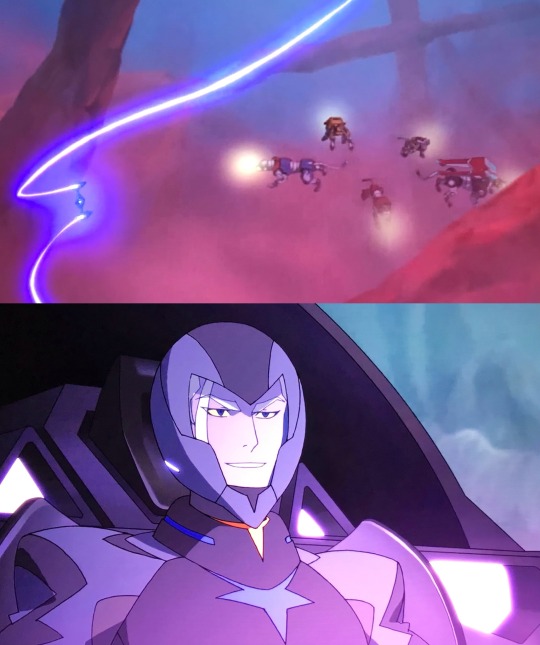
He easily lures the Paladins into multiple traps (Planet Puig, Thayserix), manipulating the battles in order to learn more about his opponents, all while enjoying himself. Not even looking to take them down, he simply wants to test their aptitudes and capture them if possible.
Ignoring his more impetuous generals, he knows when to retreat. “A leader must know when to leave the field of battle.” Something that Keith, as the new leader of Voltron, learns just now, for the first time. In many ways, the Paladins are learning new things via Lotor, and they’ll continue to learn from him throughout the seasons. As the EP’s also mentioned in multiple interviews, at their core, Lotor’s intentions are good, but his methods are not always as clean as Voltron may desire. He is operating not only from how he was raised, but also from the experience of his traumas, and we are given plenty of examples throughout the following seasons.
Lotor learns form every occasion, turning it to his advantage. The fact that the Lions can still form Voltron is “an opportunity”, which he fully wields, in S3E4 “Hole in the Sky”. Another trap for the Paladins, he effectively uses them to ‘pull his chestnuts out of the fire’. As he states, “If Voltron disappears from our world, then we win. If they make it out with the comet, we’ll take it from them. It’s a win either way.” Put that against his more tame clarification given to the Paladins, and you can see why it’s really a gray area where this man actually operates: “I’m afraid I had to be a bit duplicitous in effecting its retrieval. […] It was a calculated risk, I admit that. But I knew they’d come through without a scratch.” The high purpose he pursues (entering the rift) is worth the risks and the prices he’s willing to pay.
—————————————
In S3E5 “The Journey”, we learn something extremely valuable about him - how he has trained himself to be on constant alert about spies (remember the vipers mentioned earlier?). Swiftly apprehending general Raht, Haggar’s assigned secret agent, he decides to pay the witch a visit and confront her directly.
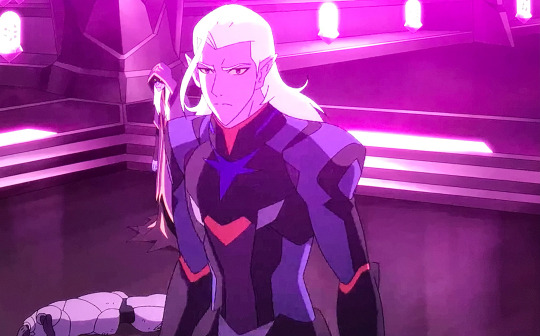
Haggar makes no gesture to deny the allegations, rather twisting the knife in his wound: “I know many ideas float through your head, just like your father, but the Galra Empire needs your leadership in these troubling times.” It almost resembles a domestic scene (I honestly chuckled), as if without realizing it, Haggar talks to him like a mother scolding her child. I find his reply equally entertaining (yet tragic), even his expression taking after that of a child desperately trying to rebel against his family: “I am the leader, but I am not my father!” It won’t be the first time when Haggar reproaches him that he’s not getting involved in imperial matters, only hiding in the shadows. That is his modus operandi - and we’re just beginning to understand why.
————————————————-
The next episode, “Tailing a Comet” holds some keys about what Lotor is up to, but also carries some mysteries which have not been unlocked to this day. We learn that he already used some of the comet ore to manufacture a ship, but we also learn that he attacks a Galra base, in order to retrieve a teludav lens. Again, he’s operating from the shadows. As Pidge rightfully points out… “I thought Lotor took over for Zarkon. Why is he attacking a Galra base?” Because - Haggar, that’s why. We know she’s tailing him constantly and she is the last person in the universe that he’d team up with. In fact, if I get to think of it, Haggar stalking Lotor is the underlying thread of the entire show.
But what of the teludav lens? Clearly, a link must exist between that and the fact that Acxa was sent to retrieve scaultrite from the belly of the weblum, where Keith found her in the first place. Allura rightfully infers that an Altean must be employed to operate it, but she guesses Haggar wrong. Yes, Haggar is Altean, as Allura discovered in direct combat with her, but it’s clear that Lotor does not want anything to do with the witch.
That leaves us with only one alternative: someone in his hidden Altean colony. (Lotor himself seems to not possess Altean alchemy powers to operate a teludav, at least none that we’ve seen). This loose thread has never been elucidated. To spread even more mystery around Lotor’s aura, even his generals have no clue about the true purpose of all these shenanigans. As Shiro says, “something strange is going on here, and we need to figure it out.” Um, actually, we never fully figured it out, courtesy of the garfle-warfled S8.
I found an interesting parallel, and again, a lesson that Keith indirectly learns from his interaction with Lotor: the advice that Shiro gives Keith at the end of this episode: “You need to pick your battles. Sometimes you have to make hard choices.” Similarly, every choice that Lotor makes throughout his life is a battle he has to pick - behind Haggar’s back, as we learn right at the end of this episode, when the witch attempts to pry relevant memories about the teludav theft out of Throk’s mind, while Lotor eavesdrops, behind the corner.
——————————————-
In S4E3 “Black Site” we get a multitude of new details about Lotor’s relationship with his family. When he is called to the imperial court to have his pro tem title dissolved, the first person he encounters as the doors hiss open is Haggar. For a very short moment, Lotor looks startled, and he casts a glance at the witch. Premonition?
As Lotor relinquishes imperial reigns back to his father, the interaction gives a quite fascinating subject of analysis. Lotor is no longer the naive youngling; he has completely abandoned the sincere vocabulary, instead glib words rolling off his tongue. He knows very well that Zarkon and him are never going to see eye to eye, but he did not come there to seek a fight. He’s not (yet) powerful enough to take him down, so the smooth-tongued approach has to be the way. He theatrically attempts an ingratiating offer to stay by Zarkon’s side and “learn” from him, knowing full-well that it will never happen. As expected, Zarkon dismisses him disdainfully.
And here’s the smirk I was talking about earlier:

It’s a rehearsed attitude, it’s the grown-up Lotor, like the tree grown under harsh weather, the prince whose childhood innocence and optimism have been replaced by a cynical, calculated demeanor, carrying out ploys behind his father’s back because the front door was closed a long time ago.
What a confident smirk.
He worked for so long on this plan.
He’s getting closer and closer to achieving his dream. He snatched the comet ore and he’s making his own Voltron. Soon he will be able to enter the rift and get as much quintessence as he needs, for his grand plans.
Unfortunately, his confidence becomes his blindspot, as Haggar taps into the mind connection with Kova.
The sad irony is that he thinks he has Haggar all sorted out, when, upon his departure, he runs a thorough scan of his ship for trackers. The scene screams “paranoia”, except this paranoia is indubitably justified. When you’ve been stalked for millennia by a family who seeks to destroy you, all your senses are sharpened, survival instinct ready to spring in action at any second, adrenalin ready to kick in.
Killing Narti, a huge blow for the team, does not ensue as a mindless knee-jerk reaction. It is a hard choice he makes, for their own survival. He learned throughout his life to decide on the run, and you can see it on his face that he takes no pleasure in killing. Narti falls victim, just like he later admits that he had to sacrifice a few Alteans to preserve the future for millions.
We do not know the circumstances in which he had to sacrifice “the few”, but if they resemble in any way the tough spot he found himself when slaying Narti, we begin to see the trail of tragedies that haunt his life.
—————————————
In S4, Ep3&5 we witness the growing mistrust of the generals towards Lotor. Ezor tells Acxa: “What about Narti? She trusted him. You saw where that got her.”
Notice that Lotor didn’t share some essential knowledge with his generals. The reason why he slayed Narti was because of the connection with Haggar via the entity inside Kova.
I believe none of the generals (except maybe Narti?) knows about the entity, his Quantum Abyss colony and his secret team building the inter-reality gate, based on their behavior along the show. Yes, Acxa might have a stronger loyalty, switching back to siding with him just from a few glance exchanges, but eventually she also renounces him.
In S8E5 “The Grudge”, Acxa explains to her friends in the gym room that “…we had to abandon the animal [Kova] on our destroyed ship so we could escape without being tracked.” This simply implies that she knew about Haggar controlling the cat, but not exactly how she controls the cat.
The rift gate scene also proves that Lotor runs secret operations that he obscures even from his generals (NB: when he deems appropriate, he discloses them). This is his dynamic way of existence: juggling with secrets among people who put their trust in him, in order to protect himself and those dear to him from his corrupt family. The trauma that he endures for millennia force him into wearing these many masks.
After his attempt to enter the rift between realities fails, his generals betray him. Most likely not the first time when people double-crossed him. The difference is that stakes are getting higher and higher, now that he has his own comet ore ships, and will continue to get higher as he’ll discover Oriande, all the more reasons for him to be extremely cautious.
But he’s used to traitors. As a matter of fact, when he wakes up, he says, with a bitter expression, “You plan to give me up. I understand, Zethrid. You do what you must, and I’ll do what I must.” This scene also foreshadows the larger breach of trust, between him and the Voltron team in S6.
Is he justified in keeping secrets from his team? Hell yes. The risk of losing Altea is so great that he has to.
—————————————
When Lotor flies too close to the sun (literally), his comet ore ship proves to be more resilient than Zarkon’s cruisers. As he dives deeper into the plasma, his expression - of desperate survival, of hate against his assailants - borders madness, resembling his turn in S6

Trauma and disintegration of his social connections, two major factors in describing a madness arc, converge right in this chapter.
If trauma from the past is not enough, being hunted by his own father is another straw atop the camel’s back. Not the last one, though. Not yet. More potent factors need to converge, to throw him off the cliff, as we’ll see.
By witnessing him completely alone, we also get a glimpse into his true character.
The moment he learns about the imminent explosion of the Naxzela planet, Lotor heads right into the heart of danger. Why would someone who, all this life, fought for his own survival, fly directly into the range of a galactic ticking bomb?
Because this is how we learn who he truly is. Alone, no external influence or circumstance, no pretend smiles or smirks behind one’s back, he takes decisions based on his true moral compass. If he were the monster the story would seemingly lead us to believe in S6 and beyond, he’d run to cover his own skin. Instead, the worry across his expression reveals just that: genuine concern.

The same genuine concern sits atop his brows as he enters the battle scene, effectively disabling Haggar’s weapon. Finally, after a long string of tragic mishaps, he secures a win. A win which he wittily and swiftly takes advantage of: “Attention, Paladins of Voltron and rebel fighters, I know we’ve had our differences in the past, but… I think it is time we had a discussion.”
BECOMING VOLTRON’S FRIEND
With S5 come Lotor’s brightest and most glorious moments, and along with them, the complexity of his character further augments.
Before I begin, I can’t help posting a side-by-side Loki-Lotor screencap, because Lotor’s prison cell screams the same design concept and I love it, for many reasons.

Also, let’s not forget this sassy first portrait of Lotor as he begins his adventure alongside the Paladins:
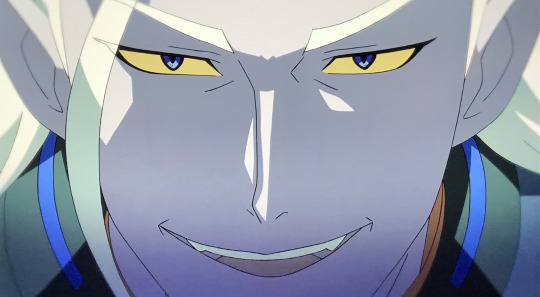
His discussions with Allura and the Paladins while serving prison time in the castle provide us with new details about him, but also lead the viewer into a skewed picture of the events.
#LotorWasFramed, shared by many on social media at the time of S6 and beyond, including by some of the VLD cast members, hints precisely at this skewed view of Lotor:
Allura says to her friends, in S5E1 “The Prisoner”, “I’m still not comfortable with this. It just doesn’t feel right.”
Later in the episode, she reiterates, “I can’t stop thinking that we might be an unwitting part of a much larger ulterior motive.”
Yes, her intuition is right, there is a much larger ulterior motive, but what is the ulterior motive? Is it truly an evil plot?
Well, take Allura’s final words about Lotor, in S8E13 and there you have it, canon-compliant: “Lotor may have been misguided, but ultimately, he wanted to preserve life. Honor your son...”
Highly frowned upon by fans as a meager redemption, truly lacking the complexity that should have reflected the richness of his character, it is, nevertheless, an exoneration, stating in clear that his ultimate goal was to preserve life - and to be more precise, Altean life, the Altean colony. We have to honor his work, because, ultimately, even though his methods didn’t feel right to Allura, even if his methods obscured ulterior motives, those motives were righteous. And Allura’s final statement is canon - one cannot deny that. The end justified the means - it truly fits into how he operated, and we can see why he had to operate that way - not only because he didn’t know of another method, but because the social and political circumstances forced him to.
So, armed with this information, we begin to see how his “ulterior motive” is plotted. He reveals to the Voltron team that his goal is to enter the rift to get quintessence, to flood the empire with a fuel currently deemed a luxury, to effectively “drop the price of oil”. A paradigm shift, a new dawn for the old empire. No more need for blood in order to obtain quintessence. A peaceful era for everyone. And he doesn’t lie. This is his intention. But not a complete picture of it.
What he doesn’t reveal is his precious Altean colony, the one that he hopes to finally be able to release from hiding, once peace has been established within the empire. In a future dialogue, he will state precisely that: “I’ve dedicated my life to preserving Altean culture. Now that we’ve unlocked the quintessence field, all of your people, who would have been hunted long ago, had it not been for my intervention, can live in peace.” Can we blame him for not revealing this to the team? Absolutely not. Knowing that Haggar can plant spies in the most inconspicuous locations, Lotor is constantly on the watch, protecting at all cost what is dearest to him - Mother Altea. And wasn’t he right? There was a mole in the Voltron team: Shiro’s clone.
————————————-
Returning to the scenes with imprisoned Lotor, let’s tap into some subtle psychological hints at his traumatic past.
When Allura calls him “the leader of the most bloodthirsty race of murderers this universe has ever known,” his reply does not arrive in anger, but with a surprisingly calm and pacifying tone, as he continues to sit down: “Can people not change? Is it so hard to believe that I wish to return the Galra empire to a bygone era of peace?” This is not the first time his mixed lineage has been the subject of spiteful remarks. For ten thousand years, he must have constantly heard the “half-breed” denigratory comments. Why would an Altean comment about his Galran blood strike him differently? He surely has grown thick skin by now.
But if these words don’t pierce the thick skin, this comment surely does: “Sounds like you are your father’s son,” says Allura with enmity, after he explains that his sole purpose has been to enter the rift.
This. This hurts. His weak spot. To have him compared with the tyrant who terrorized him for his entire life, what a blasphemy! He snapped at Haggar when she dared utter such words, and he snaps again now.
He stands up, aggravation in his expression, tone raised at Allura, attacking her with a similar family comparison: “It was your father who led the scientific exploration that discovered quintessence. An exploration, I might add, that resulted in the creation of Voltron. This isn’t a zero-sum game. Meeting the needs of the Galra empire means bringing peace to the universe. That is the future enlightenment brings us, one of prosperity for all. […] All I ask is to be judged by my actions, rather than your preconceptions of my race. If that is beyond you, then perhaps you should just finish me and get it over with. Clearly, Princess, you are not ready to end this war.”
This is obviously a subject of deep pain for him, and we don’t need any clarification as to why.
How painful?
World-shattering painful.
Maddeningly hurtful.
At this point Allura is someone he just met. He takes it personally when she compares him with Zarkon. What will happen when he’ll fall in love with her and then she’ll… revisit the same comparison?
Let’s refocus on his conversations with Allura and the Paladins:
Notice how skilled he is in dodging their questions regarding his ploys.
He admits to being “a bit duplicitous”, framing it as a means to a higher purpose - which is not a lie.
He’s not afraid to defend his political beliefs, and even fight back, ending his speech with a comment that emphasizes the maturity of his agenda, while pointing out her inexperience: “Clearly, Princess, you are not ready to end this war.” He does have a ten thousand year advantage over her, that’s a fact. (I also found it quite amusing that the very next scene depicts Allura being nervous about her lines when addressing the Coalition, while Lance advises her to… jot notes down on her palm, because… he does it all the time. Talk about inexperience!)
————————————
While the plot revolving around saving Commander Holt still holds a degree of uncertainty whether Lotor and Acxa were working together, it does seem plausible that Acxa acted in line with his interests, offering Holt to Zarkon, so that Lotor could have his one-on-one battle with his father.
Lotor attempting to convince the Paladins not to hand him over to Zarkon shows once more his tactical skills. He plants the idea of a “royal alliance” into Allura’s head (to Lance’s vocal dismay), and, perhaps due to his attraction to her, or simply as an intent to charm her, he goes as far as saying “You and I”. There is clearly chemistry between them from the start, and it’s savory to watch it unfold. Even as enemies, Allura watches him speak with mesmerized attention, absorbing his every word, and I believe it does not go unnoticed by him, which explains why he brings his focus on the unity aspect, stroking her ego with comments about their parents’ glorious past. His speech is so convincing that Allura already ponders on the “royal alliance” possibility.
The fight between Zarkon and his son is another source of precious details about Lotor. Now is the time for Lotor to speak his mind. When Zarkon calls him “weak” and “darkest shame”, Lotor doesn’t flinch. He’s grown thick skin for such insults. No longer the helpless child, Lotor sees the corrupt Zarkon exactly for who he is, and in this final moment between them, he points out all his weaknesses, especially his obsession for getting back the Black Lion.
The fight, spectacular (and magnificently rendered through animation), displays Lotor’s talent in evading direct blows and his keen eye for his opponent’s weak spots.
I found it so significant that Lotor kills his father not with a bayard, not with a sword, but with a shard of metal lying around on the ground. His desperate yell - “No!” - seeing as Zarkon points his deadly weapon at the Lions, proves once more his genuine concern for the Paladins. He kills his father to protect his allies.
His immediate facial expression is not of joy, not of jubilation, but of deep grief. I’m reiterating this: he does not take pleasure in killing, even his worst enemies. A positive trait that seems to contradict his portrayal after S6, which ties back to the #LotorWasFramed point that I made earlier.
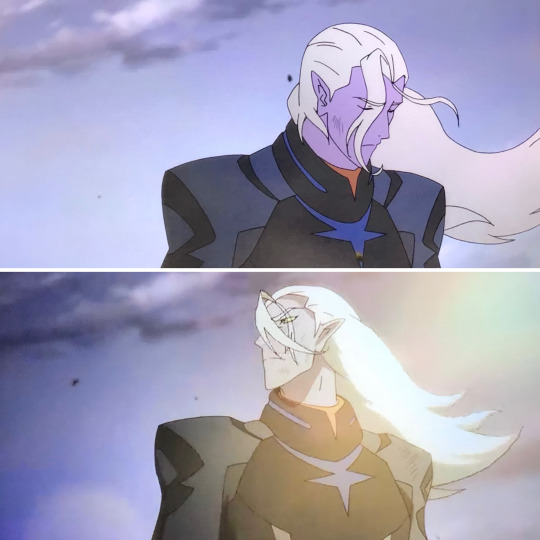
The symbolism of the post-battle imagery conveys the suffering on his expression. As the light, emblematic of the new era that is to come for Lotor, crosses his face, we see the traumatic burden of his past, a burden he carries forward. Even if he killed his own father, the act itself does not erase the multi-millennial painful past.
And we continue to see that trauma etched into his expression on many occasions, including this scene, in the “Postmortem” episode.
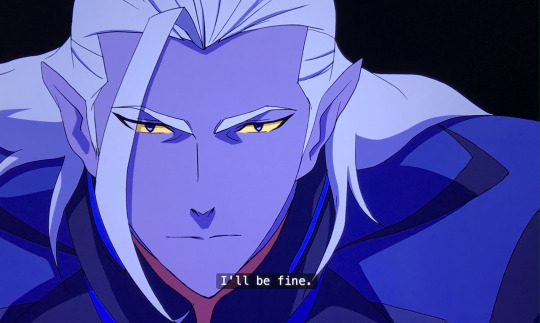
When Allura asks him, “Are you alright?” his dry answer reflects the emptiness inside him, “I’ll be fine.” Someone who wants to bury their pain would resort to similar affirmations. I’m fine. Or… Everything is fine. Or… I’ll be fine.
No, sir, you’re not fine, you won’t be fine until you address that deep level of trauma.
Instead, Lotor pushes forward, because his work is not done. In fact, he’s just beginning.
First, he must take the throne as legitimate emperor.
Then, all his attention will focus on finding a way to obtain quintessence from the rift.
And lastly, his dream of freeing Altea would come to life.
Only after that, he can, maybe, maybe, relax (does an emperor of such a vast and violent empire ever relax?).
—————————————
So let’s begin with Kral Zera. Firstly, Lotor has to convince the Paladins to fly him into the danger zone, and the only one who stands by his side is Shiro, whose tactical experience aligns with his. The tension that ensues among the Paladins makes Shiro walk out of the room, while Lotor casts a regretful look in his trail. He clearly doesn’t enjoy being a source of discord among the Paladins.
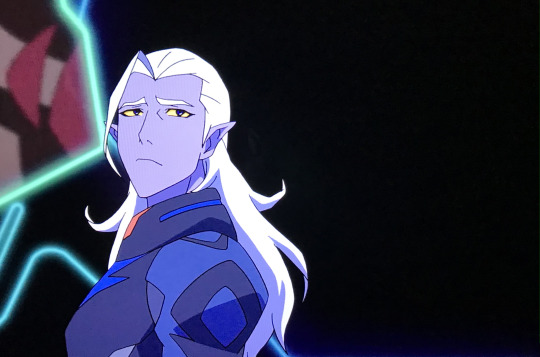
So here it is: his genuine desire for peace and amity. Which lines up with his statements about bringing peace to the empire. And we see it once more as he comments about the Galra forces fighting amongst each other at Kral Zera: “This is exactly what I wanted to avoid. I knew they would all turn on each other.”
This is the true Lotor, underneath the many layers and facades he wears around everyone.
But he is also the wily prince who sneaks out of the castle behind Allura’s back, along with Shiro and the Black Lion. Also, the way he spins the narrative in front of the Galra, boasting about returning the Black Lion to the empire? Genius.
When Haggar insults him about his Altean lineage, he dismisses her with a few words, but we can see the aggravation in his narrowing eyes. Drop by drop, all these upsets and tribulations add up to his already heavy mental anguish that he carried across the eons.
The clash between him and Sendak puts emphasis once more on his fearlessness and deft swordsmanship.
The lighting of the flame carries a solemn, uplifting, yet tragic air to it.
He ascends the battered, collapsing steps of the Kral Zera, perhaps the steps of his destiny, while explosions flare up the skies. He takes the throne of an empire in complete disarray. While he lights the flame, he harbors a stark, but also angry expression, because… why should he be joyful? He’s taking reign over a civilization that has perpetuated his traumas for so long.
———-
S5E5 “Bloodlines” provides a respite from all the anguish we’ve seen so far. He spends time with Allura, searching for Altean clues in Haggar’s lair, and we see the growing attraction between them bloom.
But watch for hints about his past traumas.
When Allura discovers that he is half-Altean, we get Lotor’s direct depiction of his status in the eyes of Galra, as well as his self-confidence in regards to his mixed genes: “It was something the Galra considered a weakness, but I considered it a strength.”
Also, his next words reveal his deep admiration for his mother. He venerates her, and he adores the Altean culture. As much as I want to emphasize the level of trauma that this man has gone through, I also want to bring under spotlight his awe for the mother he never knew, and by extension, of the entire Altean race. Pay attention: “The union between Zarkon and Honerva sparked a technological revolution within the empire. Even back then, Altean culture was remarkably advanced. The kinds of experiments she was conducting… she advanced science by eons.”
Something that always caught my eye was Honerva’s science log itself. Lotor scrolls through her research and we can clearly see the comet ore in one of them, a sphere in another and… the entity inside the tube in a third slider. It’s clearly the entity, compare it with the original image from S3E7:

The fact that Lotor casts a long look at the slides makes me think that he might be aware of the entity. Perhaps this science log will make him understand even more about it?
When Lotor makes a few comments, frowning while inspecting his mother’s science logs, we conclude a few aspects about him and his mother. “By the end of these logs, it’s like they’re written by a different person. She’s frantic, paranoid, erratic. Her reason and intellect are gone, replaced by fear and paranoia.”
This confirms exactly what happened to Honerva (and foreshadows what will happen to him as well). Due to her obsession for power and knowledge and enhanced by excessive quintessence demanded by the entity inside her, Honerva lost her reason, became… a different person. Does that not resonate with how Lotor underwent an apparent abrupt change in S6? The comparison might come across as superficial, but I promise I’ll go deeper when discussing the S6 scenes.
Also, this reveals a much deeper truth about Lotor. He is in denial about what happened to his mother. Pay attention to the scene where Allura suggests that Honerva might have turned into Haggar.
“That witch is not my mother!” snaps Lotor, taking Allura by surprise. Not only he raises his voice at the princess, but he instantly turns his back on her, leading to an awkward moment. I found this instance extremely telling. Suggesting to Lotor that his mother turned into a witch?? Unconceivable!
I’m reiterating this: he ADORES his mother, and he adores Altea. He wants to protect his mother’s image as much as he wants to protect his Altean colony, at all cost. Even if that means keeping the colony a secret from Allura - the princess of ancient Altea - who slowly conquers his heart. Was there a conflict inside him about this? I’m absolutely sure there was.
Another relevant aspect about Lotor is that he’s an Altean culture nerd. Especially the alchemy part. He’s been hunting high and low for Oriande, because his sharp intelligence guided him in the right direction. And with a bit of persistence, he guides Allura in the right direction, too. Together, they unlock the compass stone, and, despite the Paladins’ and Coran’s doubts, Lotor convinces them to “navigate by cave poetry”, eventually discovering Oriande.
—————————————
Lotor has Altean marks? The Marks of the Chosen, no less. I love the attention to the shape of the marks, too. Uncorrupted Alteans display half-moon marks, while Haggar’s look completely distorted, like scars dragging across her face. In between them is… Lotor. His marks are neither half-moons, nor disfigured shapes. Daywalker?
In any case, the fact that he is accepted in the realm of Oriande clearly means that he has potential for alchemic powers.
Even in the celestial beauty of such a place, his mind flies into dark corners, recalling the destruction of Ven’tar’s planet. This should tell you how deep his wounds go, and how desperately they need healing. With such unspeakable beauty around him, his miserable expression only underscores the level of internal trauma.
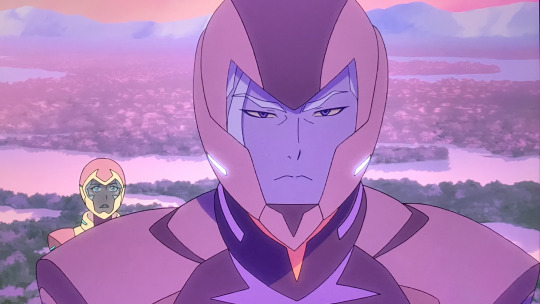
“You know, I envy you growing up with King Alfor. I always wanted to be an explorer and learn about the universe. My father was only interested in conquering it. He once put me in charge of a planet for a year, running the quintessence mining and getting to know the local population. Rather than employ the usual Galran methods of subjugation, I worked alongside the leadership of the planet, learning their customs. We would only extract as much quintessence as could be replenished. And I enjoyed my time there quite a bit. When my father found out what was happening, he ordered me to destroy the planet. I refused, and he sent me away.”
“At least you stood up for those people,” replies Allura.
“He destroyed them all. I was powerless to stop him. I spent the following centuries searching for clues about my Altean heritage, another culture destroyed by Zarkon.”
“I’m glad you’re here to help me now. I never would’ve gotten here without you,” Allura smiles back.
Notice how Allura brings lightheartedness into the conversation, always aiming his attention to the full side of the glass. When he turns around to face her, this is one of his most iconic, beautiful, gentle, hopeful, yet heartbreaking expression in the entire series:
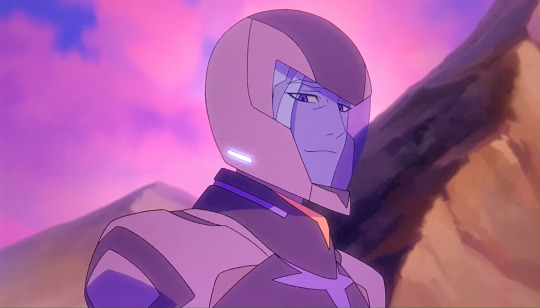
Allura infuses him with optimism, like no one else did before. She is the soothing salve over his old wounds, arriving into his life to open up a bright future. Oriande awaits them, the future awaits them. Hope and love bloom in his heart, and you can read it on his face, overlayed with the fatigue lines etched under his eyes. I know I’ve said this before, but I’m absolutely in love with Studio Mir’s clean drawing style, yet capable of rendering a vast array of emotions with just a few pen strokes.
Inside the pyramid, Lotor makes a few remarks, which reflect his curiosity but also his relative lack of instincts about what to do next. He relies on logic and educated guesses.
“The mysteries we seek are hidden somewhere deep inside.”
“We may yet to prove that we’re worthy to be here.”
“There must be a clue. Something a trained Altean would recognize.”
Similarly, when the Sages attack, his training guides him to apply known and well-rehearsed battle tactics - he’s ducking away from their spears. Allura has the presence of mind to pull out the compass stone, addressing them reverently, and Lotor - behind her - instantly mimics her gestures. Yes, he’s a fast learner, but it’s a bit too late for learning. The trial time is near.
The trial itself provides us with a head-to-head comparison between his tactics and Allura’s. They each apply themselves according to their upbringing, and therein lies the tragedy of his failure.
When he finds himself alone in the celestial domain, what do we see first, glowing in his enlarged eyes?
Fear.
He gasps as he opens his eyes, looks around warily, then calls for her, “Allura?” Without her, he is insecure, because he is not prepared for this; it’s a kind of trial he’d never attended before. (He aced the Galran Agotian trials, yet he clearly struggles here).
Of course calling out for her suggests he might also be worried about her, but I believe - from the hints given so far from their adventure inside the pyramid - that he is genuinely lacking confidence. He even stated so, as they began their journey: “None of my research or travels have prepared me for this. From here, we are on our own.”
And what do Galrans do when faced with their own fears?
Victory or death.
“I will never yield! I will gain your secrets!”
Here, I read pride, anger, determination, unwillingness to give in.

He doesn’t even consider another method; the emotional domino of fear-aggression is ingrained into who he is, from a young age. And in the end… his own aggression is his undoing.
If you take a look at Allura’s demeanor, she does not gasp in fear as she takes in her surroundings. She does not call for Lotor.
“I do not wish to fight. I come here seeking knowledge,” she addresses the White Lion.
“What can I do?” she continues, humbly.
“No. This isn’t the way. I seek the secret of life. I give my own.”
Notice the requirements of an Altean trial:
humbleness in the face of unknown;
non-aggression;
willingness for self-sacrifice.
Lotor, unfortunately, does not display any of these.
In the meditation practice, there is one particular method that helps ease anxiety, worries and fear of unknown. It involves staying with your own emotions, allowing them to unfold, simply noticing and embracing them. Fear becomes a friend which does not need to be battled, but acknowledged.
What Allura did was to basically embrace her fear of the White Lion, to allow the fear to manifest, and in doing so, she conquered it.
Conversely, by fighting with your own emotions, you only prolong your agony.
When the Life Giver tells Allura, “You are home, and the secret is already within you,” we finally understand why Allura passed this trial, and why Lotor failed. If the secret is already within her, she instinctively directs her actions according to the ancient practices and wisdom of Altea, where she grew up. At Oriande she is home.
On the other hand, Lotor is hard-wired into the victory or death philosophy, which guides fear in the opposite direction, that of aggression. At this time, Oriande is not his home, unfortunately. He yells, “No. No!” realizing his failure. It’s a cry of desperation, he’s angry with himself for his defeat.
It’s ironic though: he knows that aggression is not the way, yet he himself cannot overcome it. It’s also paradoxical, because he is searching for ways to bring peace to the universe. He preaches peace and prosperity, but he lacks the deeper understanding of how to fully achieve it. Living in such a hostile environment for millennia, we cannot but recognize that this is the way the environment shaped him. Nature versus nurture, exactly the words of one of the EP’s. Also, from the same interview: “It was a very bad hand. That deck was stacked against him in every way in his upbringing. If he had this amazing accepting family that Allura had, he probably would have been a magnificent person. He had to live his life the only way he could, and a lot of that was through manipulation and doing things the only way he could get them done. It’s tragic.” (Source: Den of Geek - The Ultimate Downfall of Lotor, June 28, 2018 - link in comments)
Despite his defeat, I found it admirable that he does not bear jealousy on Allura, honestly acknowledging her magical powers: “You are a true Altean alchemist. Oriande was for you, not for me.”
One thing I’m wondering though: did Lotor ever learn anything from his defeat? He is a fast learner, so how did he internalize this event? I’m sure Allura recounted to him how she came to pass the trial, so did he ever put the pieces together, to figure out where he went wrong?
————————————
After Oriande, Season 6 warms us up to his character even more. The encounter with Dayak in S6E1 provides us with precious comic moments that further humanize his character. Suddenly, he is not the stiff emperor with a royal demeanor and parlance, but the teenager who’s embarrassed about his mom, while trying to look cool around his buddies, which subsequently suggests that he cares about his relationship with the Paladins, also proven by the way he introduces them to Dayak: “These are my colleagues. They have more than my permission to speak.”
In addition, their dynamic gives us a moment to ponder on the type of Galran education he received. Now that we are fresh from the Oriande experience, learning how Lotor grew up - under the constant threat of the whipping pain - provides a better perspective into the kind of cards life handed him.
In the same time, let’s not vilify all his upbringing. As a prince, Dayak offered him the highest kind of education one could receive: “The history of our conquests, our customs, battle philosophy, the art of war.” Yes, they are all veered towards war-related matters, but those are subjects of vital importance to any nation, even in times of peace. The end of S8 will have Allura basically learn to navigate this dark side, guided by ghost!Lotor and the entity. As much as Lotor needs to learn from Allura, she also needs to understand and absorb his wisdom.
If one needs a summary of Lotor’s past, find it right within Lotor’s speech, broadcast across his empire: “Slayer of a tyrant, child raised in the void and taught on the battlefield.”
From the conversation between Lt. Lahn and Commander Bogh, it’s clear that Lotor’s dream of peace is too abstract for his subjects. There are prejudices against him that are hard to tame. Lotor is well aware of them; even his empyreal address reflects this issue.
But one particular conversation raised a red flag to me. At the news of Sendak’s attack on a mining planet, the Paladins offer their immediate assistance. Lotor says, “Sendak would have me respond to his attack and neglect my empire.”
Allura replies with determination, “Voltron can handle this, while you continue to rule.”
Lotor insists, “But Princess, I need you here. Without you—”
“Your plan has waited this long. It can wait a tick longer. We must protect your innocent subjects,” says Allura.
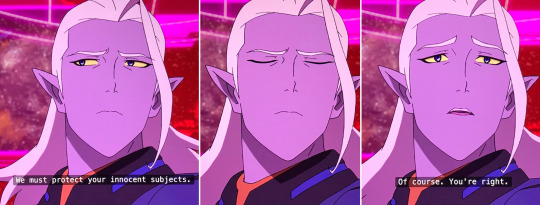
“Of course. You’re right,” Lotor acquiesces in Allura’s decision.
This, right here, introduces a major hint at a future reveal. Is Lotor going to allow an entire mining colony to perish under Sendak’s attack? (“sacrifice a few…” - rings any bell?) When Allura emphasizes “innocent subjects”, I read frustration, impatience… and something more on his expression. He’s obviously annoyed that his plans are being delayed. As he told Allura, “it is paramount” that they focus all their energy on infusing his ships with alchemy. He’s getting so close to his dream, and now Sendak comes to derail him.
This askance look suggests he is hiding something. And we read a conflict within him, in the way he presses his eyelids closed under a slight frown, then reopens them into a forced-amiable expression.
There are many ways to interpret his internal conflict:
which innocent subjects should he focus on first? The Alteans - his most precious people - with whom he hasn’t been in contact for a while, or the mining colony attacked by Sendak? What if the Altean colony is in danger of peril as well, and he’s tied up with empyreal matters?
maybe he is simply embarrassed that he let a “little” mischief slip past his mask? He’s never been put in a situation like this, working alongside honest, compassionate people, who care for the lives of others. Not that he doesn’t care overall - on the contrary, all he does is because he desperately wants to pacify the empire and ultimately free his Altean colony, but the way he goes about it requires cutting some… corners; translation - sacrifices.
maybe time is of essence; perhaps he knows things we don’t know about his colonies (there are many unresolved things about the Altean colony plot, so here I can only speculate).
all of the above?
In any case, this little detail adds an extra tint of gray to his character.
—————-------
S6E2 and E3 elevate the relationship between Lotor and Allura to a level of trust and fondness for each other that we haven’t seen them develop for others. Lotor genuinely loves Allura, something confirmed in interviews with EP’s. He is not simply using her for his secret agenda. What is blooming between them is real, and you can see it in the way he behaves around her, the gentle hand touches, the almost-kiss interrupted by the Paladins, their discussions while working on his ships, his excitement to share the “grand news” about the progress he makes on his Sincline. Allura is beginning to be the soul-healer of his past traumas; his optimism is soaring. He is able to relax more around her, as he truly trusts her.
————------------
S6E4 (“The Colony”) begins with Lotor, facing his Sincline ship, ready for the trip to the rift, telling Allura: “I’ve waited an eternity for this. […] It means so much to me to share this with you.”
The moment of his life. He’s waited for this for thousands of years. Thousands. Not decades, not centuries. The anticipation, the emotion, it must be like nothing he ever felt.
I loved the reference to the DotU little technical terms, as they prepare for the trip of a lifetime: “Infracells up. Dynotherms connected. Mega-thrusters are go.” It gives their relationship even more meaning and legitimacy in the audience’s eyes.
Pay attention to the comments the Paladins make, as Lotor and Allura enter the rift:
Lance: “Last time anyone got in there, it turned Zarkon evil.”
Shiro: “Zarkon fell prey to his own evil instincts. The quintessence field didn’t create them. It revealed them.”
I’ve used Shiro’s comment in the analysis of Honerva and Zarkon’s arcs as well, but the fact that the writers chose to insert it right before Lotor’s trip to the rift is a clear enough hint (albeit “evil” and “instincts” have nuances, just like Lotor’s numerous character shades).
When they enter the rift, there is a moment where Lotor’s eyes narrow a bit…

That, right there, is Lotor’s cunning expression he often displayed in the episodes before befriending the Paladins. It clearly points out to us that there is more going on in his mind.
An evil plot? This would be the immediate thought, right? Especially immediately after Shiro mentioning “evil instincts”.
Or maybe it isn’t an evil plot, but its execution is… less clean (“Lotor may have been misguided, but ultimately, he wanted to preserve life”). Hence, the evil-looking smirk. #LotorWasFramed?
“What we do here today will change the course of the universe forever,” says Lotor, while measuring the energy readings inside the rift.
Allura ponders over the quintessence effects, “In the hands of the wrong person, this power could easily corrupt.”
“Together, we’ll see it never does and continue the work your father started so long ago,” Lotor replies.
Two things:
Another warning: Quintessence in the hands of the wrong person…
“Together”: Yes, if they split up, things will go sideways.
“I can feel the quintessence coursing through me,” says Lotor euphorically, as they travel through the rift.
Allura, ecstatically sighing, replies, “It’s like my spirit, my whole being, is more alive.”
Quintessence is the space-drug of the series, it’s no doubt about that, even the EP’s have made the comparison. A double-edged sword, capable of conferring supernatural abilities and sensations, yet destructive enough to turn you into a Zarkon.
Not only Lotor is feeling its effects, Allura does too. Keep this in mind as I’ll discuss upcoming events.
For the first time in eons, his stars are aligned in the best possible way. They “accomplished something amazing” - entering the rift and collecting quintessence. He has the most powerful princess in the universe by his side, the gifted alchemist he so sorely needed for millennia. His plan is coming along fabulously.
But I think the most amazing accomplishment is that they finally confirm their feelings. The kiss happens. The bond that forms in their hearts is a potential catalyst for extraordinary changes, within themselves and to the universe around them. Double, triple euphoria for him.
-------------------------
Can this man’s life turn any more tragic?
The moment of… (alleged) truth happens. The moment we find out, through Romelle’s story, that Lotor has been harvesting Alteans for their quintessence, for generations. The conclusion of her accusations is that he has been draining the Alteans for his own power and glory.
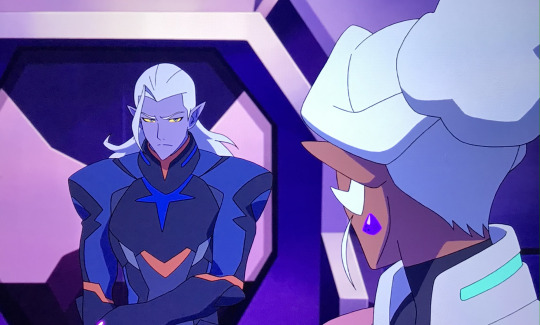
(Notice the general expression of guilt: self-hugging, chin dropped to the chest, peeking from underneath his frowned eyebrows)
DESCENT INTO MADNESS
Let’s see, from Lotor’s perspective, what shocking events he goes through, to understand the underlying cause of his mental breakdown in S6E6.
1. Physical rejection by the woman he fell in love with.
Right after the high of their kiss and their rift breakthrough, he finds himself at gunpoint, accused of mass murder.
In reply to their accusations, Lotor says, “You know nothing about what you speak. […] Allura, listen to me. I’ve dedicated my life to preserving Altean culture. Now that we’ve unlocked the quintessence field, all of your people, who would have been hunted down long ago had it not been for my intervention, can live in peace. Were some lives lost in the process? Yes. But they were martyrs to a noble cause. I sacrificed a few to preserve the future for millions. Allura, do not let this ruin everything we’ve worked for. Think of what we experienced in the quintessence field.”
From what he says, we can deduce exactly what I’ve pieced together so far: that he was deeply preoccupied with preserving the Altean life and culture - he “dedicated” his life to it. This was his purpose in life, it was what he cared most about, and every action, every little or grand mischief that we’ve seen so far along the seasons, they all point to one sole purpose: pacifying the universe so he could bring his Alteans out of their hideout, so they can “live in peace”. They were his Mother Altea - metaphorically, the mother he never had.
His explanation is vague enough that we don’t understand some essential aspects about the “martyrs”, but also, his approach to Allura, right after such horrifying news, touching her hand while reminding her of what they “experienced” in the rift, obviously rubs her the wrong way.
Fresh from the rift with a dose of ultra-pure emotional enhancer called quintessence, Allura reacts violently, without seeking more answers. From here, things quickly roll downhill.
2. Being taken hostage.
3. Facing the truth about his mother, Haggar/Honerva.
For some reason, this event in his life never seems to be a subject of much discussion. I believe this holds a large role in his traumatic rollercoaster before the battle with Allura. The discussion with Honerva reveals the fact that he is still in denial about his mother’s downfall. His fists tremble in anger - another sign of emotional gravity.
According to him, his mother “ceased to exist when Honerva drew her last breath”, while Haggar represents an “abomination”, “a twisted perversion of what was once so pure and beautiful”. If you want a little Transactional Analysis (TA) parallel, this is exactly Child-Lotor from the other reality, saying: “No. My mother is dead. And you cannot replace her!”
What I find even more dramatic is that his entire life he’s been compensating for his lack of maternal love by completely immersing himself into the Altean culture, while his biological mother did everything to thwart his efforts to connect with his maternal legacy.
This is a huge blow to his internal set of values, and the fact that he reacts with total denial suggests (again, applying TA) that, with his fears confirmed, Child-Lotor feels cornered, afraid, trapped, thus his reaction of rejection towards her.
Bear this in mind, because I believe at the core of Lotor’s tragic turn in this episode resides a wounded Child.
4. Attempting to fix it, under pressure.
He is being punched from ALL directions.
Yet he persists.
His urgent priority? Finding Allura.
Even though Acxa explains that it will take a while to get back to the castle of Lions, he replies: “Then what are we waiting for?” I read desperation, a rush to try to fix things.
Although Allura tossed him to the ground, he holds no grudge against her.
Why does he return to her?
Why not the colony?
After all, it was his most precious planet in the universe! Oh, but this is not a tactical decision… It clearly stems from his emotions - he will soon confess it as well - because he truly loves Allura.
The fear of losing her is greater than his fear for the colony. Now that the secret is out, now that he knows that clone-Shiro was Haggar’s spy, it must be clear to him that his colony is completely exposed. The Altean civilization that he worked so hard to protect from the evils of his parents is inches away from being overtaken by Haggar, yet he flies right back to Allura! How telling!
Oh, but the way the story frames it leads us to believe that he wants to get back to the rift due to his greed for more power, because that was Allura’s conclusion about why he was returning: “He needs to get back into the quintessence field.”
No he does not. His Sincline can jump in and out of the rift at his own will, so he can access the rift from anywhere. He explicitly said to his generals that, “We’re headed to the Castle of Lions’ last known location.” (S6E5) He’s not headed to the rift, he is headed towards ALLURA.
“Accessing the quintessence field has been Lotor’s singular drive for millennia. He wants to harness the power for himself, but we cannot let him,” says Allura in S6E6. Wrong. What did he just explain to her earlier? “Now that we’ve unlocked the quintessence field, all of your people, who would have been hunted down long ago had it not been for my intervention, can live in peace.” Accessing the quintessence field does not reflect his final goal, it is a means to a higher purpose: freeing the Alteans.
5. The fallout. The dam-breaking moment.
Let me start by saying that Lotor is generally a calm and composed character - a mask he has built into his persona and practiced it for millennia, because he needs to display confidence, not weakness, around both his subjects and his enemies. It is the way of the Galra. Also, the attribute of a leader.
That doesn’t mean he does not show moments of panic or outbursts of anger. On the contrary, we witnessed them along the episodes: when killing Narti, when flying into the solar flares, the moment he kills Zarkon, when snapping at Allura… These little slips hint at the true emotions roiling underneath his mask. Most of us understand this mechanism; think of school exams and how anxious we felt inside, despite displaying a relatively calm expression while entering the test room.
Given the extraordinary tension of the negative events that befall right after his most triumphant moments, what are the odds that behind this façade, Lotor’s anxiety is at an all-time high? The fact that he does not show it yet doesn’t mean it’s not there. But we’ll begin to see it, as soon as he starts talking to Allura.
En route to Allura, Lotor tells his generals: “Zethrid, Ezor, my deepest apologies for lying to you both, but in order to gain the princess’ trust, and make the Paladins of Voltron believe we were truly at odds, it had to be done. […] Today we will gain access to unlimited quintessence, and together, we usher in a new era of power.”
Did he just slip back under another one of his facades? Did he truly trick Allura and the Paladins? Perhaps yes, but not in the way we are led to believe.
What he says is true - he did have to pretend to be at odds with Zethrid and Ezor in order to gain the Paladins’ trust. Imagine the chaos (not that we wouldn’t have enjoyed it) these ladies would have brought to team Voltron. Would Lotor risk his reputation with such “scoundrels” around the innocent Paladins? I mean… Zethrid replies, “As long as I get to blow something up, I’m good.” That wouldn’t fly with Allura.
Lotor basically gave each side what they expected to hear, while he pushed forward with his agenda. In order to gain Ezor and Zethrid’s trust again, he had to explain himself, and he doesn’t really lie, does he?
But what’s up with ushering “a new era of power”? Hehe, this is where we all get tricked into thinking he wants all the power of the quintessence for his own glory, thus we’re mentally confirming what Allura just said: “He wants to harness the power for himself.” Wrong again, and I’ll link this up to his next statements.
After the Paladins destroy the inter-reality gate, they ready themselves for a confrontation. They expect Lotor to come with guns blazing. Hunk even calculates the odds of three Sincline ships to four Lions. Lance, the team lead in Keith’s absence, orders: “Hold your positions. Let Lotor make the first move.”
Well, Lotor’s first move, even after seeing the gate destroyed, is to seek peace. He does not lie in any of his statements; these all tie in together with what he’s been saying so far. “We need not fight today. We are all on the same side. I know what you all must think of me now that you know my past. It doesn’t have to change our future together. The truth is, I want to harness the power of the quintessence field to better the universe, just like I said. Nothing has changed.”
Allura, raising her voice, replies, “You enslaved countless Alteans. Harnessed their life source for your own personal gain. How many innocent lives did you destroy?”
Lotor calmly attempts to explain: “Allura, I—”
“How many?” she roars back, without allowing him to finish.
(What was he going to say? He was clearly going to divulge exactly the key detail we are missing from the colony story, but Allura, whose temper is out of control, diverts the subject.)
After a deep breath under closed eyes, Lotor replies, “It’s true. Many Alteans perished in my quest to unlock the mysteries of quintessence. But I protected thousands more, and I rescued their culture, our culture.”
Comparing Allura and Lotor’s demeanor, it’s clear that Allura is the fire-starter. Not without reason though; from her perspective, one of a victim of mass-destruction, she has every right to be mad, and we, the viewers, sympathize with her.
On the other hand, Lotor seems to keep it together. He truly loves her, otherwise he wouldn’t try so hard for a peaceful solution. Even Zethrid asks, confused: “Why is he pleading with the Paladins? Why are we not opening fire?”
Ezor says, cynically, “I stopped trying to figure out Lotor’s master plan long ago. Too complicated!”
The only one who seems to comprehend what’s going on in Lotor’s heart is Acxa, who casts a worried glance towards him. Worrisome indeed, because heartbreaks are most terrifying, if things go out of control.
“Allura, you must understand I’ve given everything I have to plumb the depths of King Alfor’s knowledge, to unlock the mysteries of Oriande. Please, Allura, we’ve come too far together. Surely, you can see the greatness we’ve already accomplished. There’s still more to come. Join me. We’re on the same side.”
“No, we’re not!!” Allura screams at the top of her lungs, blasting her Lion’s canon at him.
Notice, Allura fires the first shot. Lotor, in response, yells at his generals: “Hold your fire! Hold your fire!” Acxa is sweating in tension - because she intuits how bad this could go. Zethrid is frustrated, while Ezor looks completely confused.
Lotor, keeping it together with his last emotional energy, is desperately trying to reach Allura. His voice trembles from the emotion, from the utter despair and anguish. His pupils have narrowed, eyes wide open. He sees his most precious relationship falling apart, he’s clinging to a last thread of hope. Allura is the one true love he met after ten thousand years of traumas and the most gifted alchemist. He has given everything he had to arrive here.
Altea awaits them. Together they could bring their people out of the shadows, they could rule a New Altea, “a new era of power” as he told his generals.
“Allura, stop! You and I hold the ancient knowledge of our Altean culture. We were meant to be together. My feelings for you are true - and I know you have feelings for me as well.”

Cry as many rivers you need to, because this is the most tragic declaration of love.
Lotor, right here, wears his heart on his sleeve in front of everyone to see. Vulnerable, open-hearted, sincere - perhaps the most sincere declaration of his entire life, he opens himself up to Allura, he puts his trust in her, with all his wounds and unresolved traumas of the past.
Remember the “I’ll be fine” reply after defeating his father? No, he is not fine, his wounds have never healed.
This is why Allura’s reply falls like a guillotine on his already ravaged soul.
“You betrayed and used me. You’re more like Zarkon than I could have ever imagined!”
Comparing him with Zarkon? The one man who destroyed his life, who terrorized him for eons? We’ve seen his irked reaction to this comparison in the past, but now? Now the emotions are at all-time high. His bleeding heart is out for her to see, and she slays it, full-force.
Every trauma from his past converges here. This is the boiling point, the dam-breaking moment. This is where his hope dies. The moment of agency. (As I said in the beginning, at the critical point of the madness arc, whatever breaks the dam is a world-shattering event: extreme grief, total loss of loved ones, closest allies and friends, the breach of trust towards the world, or a combination of these. The character will try to fix the world and/or get back at the ones who hurt him.)
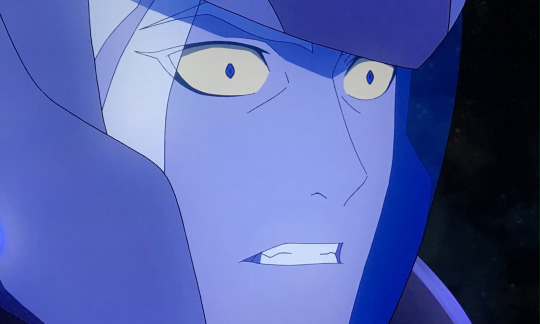
The shrilling noises of the soundtrack make us cringe, like we could feel the shiver that runs down his spine as his heart suddenly grows cold. He replies with a stark voice. “What about your father? He may have been a master engineer, but Alfor was too weak to defend his home world. I’m the one who had to step up and save our entire race. Who are you to question my tactics in bringing peace and prosperity to the universe?”
Remember his similar reply when he was a prisoner in her castle? It’s his gut reaction to a most sensitive subject: his father. She wants to talk family? He’s punching back with brutal opinions on Alfor, because at this point he desires nothing more but for her to feel the same kind of pain.
“Who are you…?” She’s a stranger. Someone who doesn’t have a place in his heart anymore.
“Destroy the Lions,” he orders his generals over a cold expression. He’s made his choice.
Hell breaks loose.
If you think that the negative effects of the rift trip applied only to Lotor, let me put this in perspective:
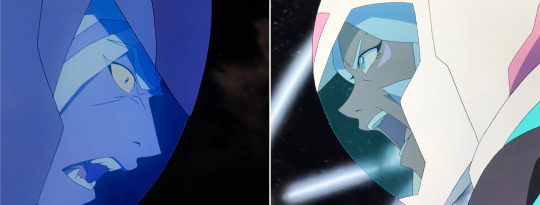
Allura is equally overloaded with adrenalin. And from the battle scene, we can see that she is the one attacking him first, her roar as loud as her Lion’s. As the fight continues, Lotor perfectly executes evasive maneuvers around her, continuing to keep a blank expression, until… he erupts, like a volcano of unresolved, under-pressure turmoil:
“Once I wipe out Voltron, I’m going to start a new Altea. An Altea that will never know of Princess Allura or King Alfor. Nor will they know of the Lions of Voltron. All they’ll know is me, their great leader! Hahaha, I’m ready to wipe the universe clean of all my enemies. Voltron, Haggar, and the rest of the Galra!”
Here’s where many of us got him wrong, thinking that this has been Lotor’s real intention from the get-go: to destroy Voltron and rule a new empire for his own glory.
The only way I can properly explain this is through the psychological mechanisms - not only what goes on in Lotor’s mind, but in our mind as well.
1. Let’s start with us. The script so far played to convince us that Lotor planned this evil plot all along. How did we get tricked? Through all the little hints dropped along the way, which I already pointed out. Our knee-jerk reaction naturally ensues as “A-ha, I told you so.” However, many of us began to have doubts.
2. Shifting the focus back on Lotor, here’s what I said right after the scene with the destruction of Ven’tar’s planet: “after Zarkon destroyed his heart, Lotor ran straight into the arms of Mother Altea”.
I remember, earliest childhood memories, that if I was mad at my dad, I would run to my mom. If I was upset on both of them, I’d cry for my grandparents. It’s only natural that the child seeks love, affection, protection, and as we grow older, that Child within us, with all its basic emotions and needs, continues to coexist underneath our Adult.
The bigger the wounds of the past, the larger the needs of the inner Child.
What happens when the Child within us loses all emotional contacts, all the love and support it sorely needs? When all our friends and allies are gone, when we lose contact with reality, when the closest friend and lover stabs us in our deepest wounds… where do we go from there?
Where did the wounded, cornered Child-Lotor escape, away from the cruel reality around him?
What was his last refuge? His last place where he he would always be received with unquestioning devotion by the masses?
ALTEA.
The Alteans praised him as a god, a messiah, their savior. His statue dominated their landscape.
Altea was his life-long project, the only heritage from his real mother, the place where he poured all his passion (“I’ve dedicated my life to preserving the Altean culture.”). Until he met Allura, that had been his only source of love and joy.
Altea was the family he never had.
Who we see here, screaming and kicking, is the wounded, cornered inner Child, irrational, filled with pure negative emotions. There is no reasonable Adult in the picture, no normative Parent, just pure madness. Fear leads to aggression (the Galra way), similar to his reaction of slaying the Lion at Oriande. He screams about becoming the great leader of a new Altea that will never know of Allura, Voltron, Alfor, etc, because ALTEA IS HIS LAST PLACE OF REFUGE, where he hopes to forget about this painful past. Child-Lotor is hurt, deeply hurt, he wants destroy all who wounded him, then run away into the arms of Mother Altea. He descends into madness with guns blazing, ready to get back at those who hurt him, and in an ultimate irrational cry, he includes the Galra in his list of mortal enemies, because they, too, hurt him when he was a child.
He bitterly comments: “Even my generals betray me!” A self-fulfilling prophecy, as he becomes disconnected from literally everyone.
Acxa yells “Lotor, don’t do this!” as he ejects them one by one from the ships. She knows what he’s about to do - form the Sincline robot, because she worked on building the ships. She knows how powerful it can become and realizes how far Lotor is gone.
Sprinkle quintessence atop the irrational, negative emotions and the cocktail for disaster is right there.
Quintessence “reveals evil instincts” indeed, because
negative emotions are evil,
and emotions are instinctual (the definition of emotion is “a natural instinctive state of mind deriving from one's circumstances, mood, or relationships with others”).
Allura recognizes it during their battle inside the rift, when the Paladins begin to drift into rage. “We have to get out of here,” she yells. “This is exactly what happened to Zarkon. Exposure to all this quintessence turned him into a monster!”
—> So, did Lotor harbor “evil instincts” all this time? Well, we all carry negative emotions. The Paladins did too, when they screamed “Let’s destroy that guy!”, “Finish him!”, except that Allura pulled the plug before they could all become corrupted (the best way to prevent drug dependence is to not get exposed in the first place).
—> Does this confirm that he’s been planning this plot all along, that he truly wanted to become the all-powerful, “great leader” of a new Altea that would obliterate Alfor’s legacy? ABSOLUTELY NOT. It only proves that what happened to Lotor was a tragic descent into madness, a resultant of unresolved mental illness accumulated along the millennia, enhanced by a series of misfortunate events and misunderstandings between him and team Voltron, and blown out of proportions by quintessence (and maybe the little entity inside him, too).
After S6 dropped, viewers were complaining that they did not recognize this Lotor, that this was a different person. Well, remember what he said about his mother, when inspecting her science log? “By the end of these logs, it’s like they’re written by a different person. She’s frantic, paranoid, erratic. Her reason and intellect are gone, replaced by fear and paranoia.”
Voilà.
So then, what did Lotor want when he was in his right mind?
Exactly what he said: to bring Altea out of the shadows, into a universe free of violence. Bonus: having Allura with him meant that together, they made sure the quintessence never got into the wrong hands (idealistic, I know, but the man had a dream). Ruling alongside Allura, the “royal alliance”, would have been his most blissful destiny.
Did he plan on destroying all the Galra? I don’t believe so, because he told Allura that he wanted to “meet the needs of the Galra”.
Maybe get rid of some inconvenient warlords? For sure, they’d all rot with the ice worms.
Maybe install an Altean leadership instead? “A new era of power?” It’s quite possible that might have been in the back of his mind. Who knows, maybe it would have turned just like the alternate reality where the Paladins traveled, where the enemies of Altea were turned into “non-cogs”. Anything is possible, we’d have to ask the writers what they had in mind.
Did he dream of becoming the “great leader”? Maybe not in a megalomaniac way, but he probably envisioned himself as a benevolent emperor, since he had a huge need for validation and love. His giant statue is a testament to that.
Did he want all the power for himself? No. All evidence points to the fact that he was willing to share it with Allura (“royal alliance”), with Voltron, with the Coalition. He even tells them, through boiling wrath: “It didn’t have to end like this.”
Some voices insist that Lotor could have told Allura (at least Allura, not the others) about his secret colonies, but because he was hiding that, it meant that he was hiding evil intents. No, he couldn’t tell anyone, his hands were tied because of Haggar stalking him. When Allura was piloting Voltron, her mind was connected with the rest of the Paladins. If Haggar had access to clone-Shiro’s mind, what would prevent her from tapping into the others’ minds?
“Now we will see how Alfor’s legacy stands against the new Altean defender!” screams Lotor during his clash against Voltron.
Altean… DEFENDER? I know this is irrational Lotor talking, but maybe this had been his plan all along? To create defenders for Altea, machines capable of fending off Galra invaders? If this is what his second colony was all about, then Allura’s visions in S8 also make sense - her mother telling her about protecting Altea against the Galra. Speculating.
As the battle heats up, Sincline jumps in and out of the quintessence field at will. Along with that, we begin to see him turn more and more rogue, as the quintessence gradually poisons him.
“Unlimited power is mine. All realities will fall to the new Altean Empire.”
A new Altea, a new Altean defender, and now… a new Altean Empire. At the peak of his madness, new delusions of grandeur emerge - yes, now he wants unlimited power - but perhaps we can also take a little peek into his secret wishes? He’d dream of replacing the Galra ruling with an Altean leadership? It would make sense, since he loved Altea so much.
These are 100% madness tantrums: if nobody loves me, I’ll destroy all of you and rebuild my own world.
It very much resembles Honerva’s peak of madness: “If I cannot experience the simple joys of life, why should anyone else?” (Translation: If nobody gives me what I want, then screw you all.)
-----------------------------
We know the rest of Lotor’s arc, or what remains of it. Left in the quintessence field, then recovered by his mother in S8E6 “Genesis”, and, for the following episodes, Sincline is dangled in front of the audience like a carrot, only to wave goodbye to his ghost in the end, with a short “he deserved better” conclusion. Oh, let’s not forget about the cOrPse.
—————————————
Earlier I talked about the “alleged truth” that Romelle brought to the story, because up to this date we don’t know exactly the entire backstory of the colony, yet…
A. We were told all along the remaining of S6, entire S7 and almost all S8 that Lotor was
“a monster” (Romelle, S6E4),
“a murderer” (Pidge, S6E4),
someone who “fooled” everyone around him for his own power (Allura, S6E6),
who harnessed the Alteans’ life source for his “own personal gain” (Allura, S6E6),
a man who “preached unity, but in the end he only sought power” (Acxa, S7E3),
who “used” his allies, leading them down “a painful path, a never-ending cycle of destruction and loss” (Acxa, S8E5)
B. Out of nowhere, Allura exonerates him in the last episode of the series, asking Honerva to “honor” her son: “Lotor may have been misguided, but ultimately, he wanted to preserve life.”
So which one is it: A or B?
You don’t suddenly honor someone after you called them “murderer”, power-seeking “monster”, unless… something of extraordinary importance has been unveiled, to properly provide an exoneration of his character.
Was it ever unveiled? No.
Then, rational deduction… #LotorWasFramed?
I think so.
It started as writers’ deliberate story framing (proof provided in my above analysis), leading the audience to believe in a “he-was-evil-all-along” nature of Lotor, with the clear expectation of a much larger reveal later down the series, that would subvert the “villain” trope. In my opinion - based on logical deductions and supported by evidence of altered animation circulating in the fandom extensively, the big reveal was excised from S8, the only clues left residing in… metaphors and visions - Allura’s visions.
Reason of such excision? Just like the tragedy of Lotor’s arc, the tragedy of VLD lied in the conflict between the IP owner’s commercial target (toys for boys aged 6-12 and robot cartoons with classic, simple tropes such as good vs. evil, boy-hero gets the pretty girl, etc) and the actual execution of the story, which deployed complex characters like Lotor, Allura, Honerva, the Paladins, and so on, embraced by a different audience niche. Yet, even if the finale of S8 attempted to erase such complexity in order to realign the series with the aforementioned commercial intent, the creators nevertheless managed to insert their concluding message into the final episode - Lotor ultimately wanted to preserve life - thus, he deserved better.
———————————————
Season 8, although I consider it incomplete in regards to Lotor’s arc (and other arcs as well), does provide us with some interesting hints at what could have been, if the story hadn’t been altered, which would have further elucidated Lotor’s overall arc, because these hints contribute to showing us his true nature.
—> In S8E6 “Genesis”, Sincline has the target locked onto Allura, yet it does not open fire. We clearly see through Lotor’s eyes, as he readies his aim.

There is no doubt that a sentient soul coordinates the decision not to shoot. This reminds me of Zarkon’s singular confession to his son: “She was my only weakness.” Similarly, Allura is Lotor’s only weakness.
This scene begs a series of logical questions (*cough*, I love logic): if a sentient being operates Sincline, how can Lotor be dead? A dead man cannot operate Sincline.
If Honerva uses the entity to remote-control her living subjects and she also remote-controls Sincline, then logic would suggest that… a living subject, infected with the entity, inhabits the cockpit. Not a corpse.
Honerva tells Allura: “I am the only thing keeping my son at bay.” Um, she can’t really keep a dead son at bay, can she?
If he’s alive, then why are we shown the suggestion of a corpse, in S8E10? Or was it another altered scene? NB: static images are easy to redraw.
Also, motes of purple quintessence effuse from the “corpse”. We’ve seen these before, with Zarkon and Honerva right after coming back from the rift.
If the assumptions above are correct, then this scene would further align with what I have said in my previous metas regarding Zarkon and Honerva: the entity’s takeover happens as a gradual progression towards complete disconnect from self. At this point in the story, Lotor would be at the far end of the madness spectrum, completely possessed by the entity and overloaded with quintessence. This would create a coherent story, paralleling those of Zarkon and Honerva.
This theory about Lotor having the entity would also justify the next point:
—> Allura’s visions in S8E8 are a rich source of information.
Just like Honerva can telepathically connect with her subjects via the entity, if Lotor has the entity and he has a strong attachment to Allura, then he is telepathically causing her dream.
Since what Lotor tells Allura about the entity turns out to be true, why wouldn’t the other elements of her dream be true, too? (“nothing ever truly goes extinct” = he’s not really dead; “we both seek to destroy Haggar” = Lotor has been fighting Haggar all along; he’s showing her how to fight Haggar, because that’s how he did it in the past - and that can be seen as an explanation for his second colony, because it clearly implies that sacrifices have been made).
If Allura’s dream provides an allegory to Lotor’s second colony, it would justify the meaning of Lotor’s words: “they were martyrs to a noble cause.”
Also, this statement would provide backup: “Many Alteans perished in my quest to unlock the mysteries of quintessence. But I protected thousands more…” If he was looking for a way to use the entity and the quintessence to defend his colony against the Galra, then he was definitely on a quest to unlock their mysteries, to protect the thousands more.
In this context, the heist of the teludav lens in S3E6 has a justification, as he may have intended to use Alteans to operate it, in another one of his “quests”.
Although the origin of the clandestine, pure white vats of quintessence was never fully explained (the quintessence allegedly extracted from the second colony Alteans actually looked quite purple), the story made it clear that Lotor was using the ultra-pure variety to infuse at least his Sincline ships with it. If he calls his Sincline the new Altean Defender, perhaps he tested other vehicles as well, using that pure white quintessence?
These would all tie together his arc, and the last statement of the story would make absolute sense: “ultimately, he wanted to preserve life.”
—> Aside from these remarks, there are many other metaphorical takes to Allura’s vision.
Ghost!Lotor visiting Allura in her bedroom immediately sent my thoughts to a folklore myth that is common to many cultures, from South America to Africa, to Northern and Eastern Europe and beyond. The “incubus” is a demon or a soul that visits sleeping women, in some traditions thought to be a man who was rejected during his lifetime by a woman, seeking to get back to his lost love. A symbol of unrequited love, erotic temptations or female desires, the incubus bears many names, according to each folklore. “I thought you’d be happy to see me,” says Ghost!Lotor, perhaps reading her mind?
“The ancients believed that all of life began with a single juniberry flower.” Foreshadowing the last episode’s rebirth of the universe, perhaps Lotor was supposed to accompany her in the grand restoration?
————————————
Even without S8, my point is that Lotor’s story followed a madness arc, slowly evolving along his multi-millennial life, and subtly hinted at throughout the show. Despite arriving at the same level of insanity as his parents, the reasons for his downfall were truly tragic, and, had the last season been allowed to develop as intended by the writers, Lotor would have been vindicated through a fully-fledged arc, just like his parents - thus, he deserved better and, in my opinion, the writers deserved better. The proof is in the details, and I’ve zoomed in quite a bit during this analysis. VLD gave us an amazing show with complex characters and most inspiring animation art.
This is probably my last meta on VLD. Going forward, I’ll focus more on the bright side of things: fan art and fanfics. See you on the other side! 😘
#lotor meta#lotor#prince lotor#mental illness tw#ptsd#childhood trauma#voltron meta#vld#psychological analysis#lotor deserved better#long meta - whew#I just couldn't stop writing LOL#there is so much depth to this character#I had this meta on my to-do list for a year#finally got around to write it#thanks for reading
47 notes
·
View notes
Text
“The duffers are just two straight white guys who want the hero to get the girl, with a slap dash of role reversal because she’s the one with powers”
Counter: The Duffers are two nerdy white guys who have never once been confirmed as straight (one simply happens to be married to a woman) who had a chance taken on them by a big studio who now—by some social deference to nostalgia with thrilling elements—show run one of the most popular shows in the world.
(forewarning for some pettiness & some sarcasm lmao)
They have literally said they are film nerds surprised by their audience because they expected it to appeal only to people like them: fellow nerds and film kids (who went to one of the most well-respected film schools in California, and maybe the states) whose OG pitch was inspired by Denis Villeneuve (director of Prisoners, Arrival, Blade Runner 2049, & Dune to name a few), True Detective (Cary Fukunaga), and the subversive horrors & fantasies of their childhood—and who have shown season over season they are entirely unafraid to vilify homophobia, subvert heteronormativity, and tell queer stories with deference to the emotions of the queer person.
They have also again and again shown that they do not necessarily defer to or even agree with the things their actors say implicitly (making faces when they say things they don’t necessarily agree with) and explicitly (saying “we’re not game of thrones’ when Millie + Noah said they should start killing people off). They have said more than once that they regret leaning into public opinion or fan desires over the story they want to tell, and that they will not be doing so for their final seasons (despite knowing it will upset some of their fans).
Now….with all of this in mind—you want to bet that these two men are planning on “subverting the trope” by doing…the same shit every show you’ve ever seen do to their queer characters? To undermine an entire season of romantic tension they placed between two of the male leads in an ensemble cast, INCLUDING confirming that one of them is in fact gay and in love with the other one, despite knowing how important good storytelling is to them based on their words and inspirations? To internalize the words of one of their actors at a fan con (who merely said he “doesn’t think” something, and then said “we’ll see”) as law over 6.5 years of evidence proving they are literally just going to do what they want, actors and audience be damned?
Lmao. Just…lmao.
I don’t worship the duffers by any stretch of the imagination (and in fact have a fair amount of critique for how certain things were handled) but…even I know believing their idea of a good story is 1) gonna do the same shit everyone else has before them to queer characters they’ve already shown more respect to than not and 2) going to be dictated by the whims of people upset at them for simultaneously being too heteronormative and not heteronormative enough is…laughable, to say the least.
Please realize that actors and fans are not the central drivers of story in this show (unlike so many others) and rest from the constant emotional rollercoaster of believing everyone but the people who run the story. I promise you will know a lot more peace, in life and on the internet lmaooooo
#byler#every time I see people argue about this I have to laugh lmao#like. please. this isn’t supernatural or voltron or Disney or whatever else#‘the duffers would never’ and their evidence is every show the duffers haven’t done LMFAO#anyone who has ever watch a film or know a pretentious film kid would KNOW that#and also…the duffers are literally not writing for the ‘GA’ or whatever and have SAID IT#so idk why anyone is pressed#anyway. let me get back to gifs and my little prisoners analysis ok#st commentary#stranger things#the me tag#my st commentary#duffer brothers
178 notes
·
View notes
Text


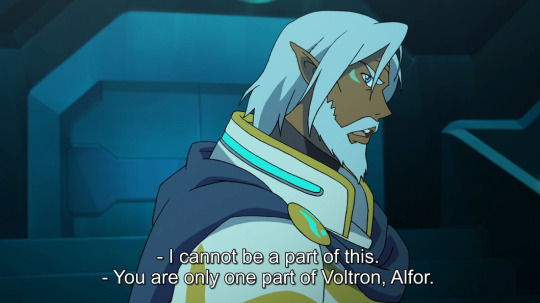

Me, dishing out short metas about the Lions in the year of our lord 2023? More likely than you think.
I revisited some scenes and fondly see some common threads as to why Red selected Alfor, Keith and Lance. The official handbook (that lines up with the era of the show before the Head of Story, Tim Hedrick, was too boxed in and disallowed from following the story bible he put together) says determination and instinct on top of skill are key traits to pilot this most temperamental, most unpredictable and most unstable out of all five Lions. She's the speed demon of the team.
Alfor followed his instincts about researching quintessence to defy Zarkon twice.
We know that Keith is fine with defying anyone, even Shiro at the end of the day if he has to.
In my opinion, Lance's learning point was not caring what others thought of him and stop trying to do the "cool" thing. Defying that insecurity about self and thus being able to defy others in situations: wherein he would previously not be able to make that difficult decision. In early S3 he manages to be unflustered and stable to redirect Keith towards calm leadership.
So it's about making tough calls and sticking with the consequences, something shared with being in the position of Black Paladin. In fact, Red and her pilot has had to step in to lead and redirect the leader (Black) a few times. A failsafe if you will, to step in and take the reigns if needed.
She is second-in-command but she's also the wild card Lion. While by default she is unpredictable, she is the untameable one - more so than Black, I'd say - which is in a way what's most consistent in her, and is the most predictable thing about her. She'd expect any of her pilots to also have principles strong enough to defy upper command if such an act may actually be needed for the benefit of the team.
Which is interesting because..these qualities makes her not so different from her supposed polar opposite, Yellow, who is responsible for making the team morale as unshakeable as possible - "[the Yellow Paladin's] heart must be mighty" - plus civilian search-and-rescue. A consistency in principles and morals even if it is a high price to stick to them.
(While for Blue and Green, they're opposites in the sense that Blue requires spontaneity, while Green requires meticulous observation. Where they are similar is they are crucial in gathering intel. Blue's sonar ability, Green's cloaking ability)
You may need Red for offense but also defense for the team i.e. she pushes another Lion to safety twice in the show: Keith supporting Shiro in the S1 finale, Lance sparing Allura damage in S6 (which was good, since she has her Altean healing ability for herself and also others).
I really really would've wanted to see Alfor using the Rail Gun though. I wanted to see what would piss him off enough or make him scared enough to activate it. In all his screentime he never truly lost his composure (Allura is mostly like that too, she clearly gets it from him) but that one weapon requires a huge burst of unforced passionate emotion to activate: much like how a war cry works. Fitting for the Fire element she is matched to and the guardian spirit of.
Alfor is an alchemist and more cerebral which is so different from his two successors are like. His fire burned differently but he was definitely passionate.
#I'm not entirely opposed to the Lion Swap: I just wanted it to be short-term#the red lion#alfor#vld#voltron#vld lions#voltron lions#vld keith#vld lance#fondly reminiscing about these beautiful machines designed by Studio Mir#vld analysis
73 notes
·
View notes
Text
Me, My Self, and I: An Analysis of the Operation Kuron Storyline
Back when seasons 3, 4, and 5 released on Netflix, Voltron fans were split into two camps regarding what was going on with Shiro: One camp insisted that we were still seeing the same Shiro as the one we saw in the first two seasons, while the other argued that the current Shiro was a clone programmed with the memories of the original.
On the surface, the show’s 6th season appeared to side with the clone theory fans, and I saw multiple people who had argued for it being the same Shiro lamenting because they felt that all the development Shiro had gotten after the end of Season 2 had been wasted now that we knew the Shiro we’d been following since Season 3 wasn’t the real one.
Even then, however, fans who supported the clone theory were upset because they felt that the resolution of the original Shiro’s consciousness being transferred into the clone body was effectively killing off a separate, unique character who deserved to have his own life independent of the original Shiro.
Yet while I could understand where both sides’ complaints were coming from, I never had that same feeling of outrage.
At the time, I assumed it was just because I noticed that it served as a bit of meta commentary on how the original 80s cartoon took two identical looking characters in GoLion and melded them into a single character.
But after talking to @leakinghate and @dragonofyang a while back, I realized that there was a deeper meaning and symbolism to the whole Operation Kuron storyline that, in hindsight, I had managed to pick up on subconsciously thanks to being exposed to similar ideas in other stories.
And once I became aware of those similarities, I couldn’t help but look back at Voltron and realize that many of the assumptions the fandom has about the details of Clone!Shiro’s story are not actually supported by the show’s lore.
For example, despite the paladins referring to him as such in Seasons 6 and 7, the idea that the Shiro we see in Seasons 3-6 was a clone in the usual sense that we expect from science fiction - that is, being a unique individual made from an existing character’s DNA with their own separate consciousness who develops their own identity and personality independent of the person they were created from - is not actually supported by the show’s lore.
For starters, the only people who use the word clone to refer to the other Shiro are the human characters, who do not have any intel on how “Kuron” was created. Meanwhile, none of the characters who are involved in Operation Kuron use the word clone to refer to him at any point in the series. In fact, even Haggar herself treats “Kuron” and Shiro like they’re the same person when she’s telling him to lead Keith away in S6E05. When you would think that if there was no point in pretending anymore she would at least acknowledge that he’s not the original.
Furthermore, based on what we are shown of the technological and magical capabilities of the Galra empire, it is not possible for Haggar or the Galra to just download Original!Shiro’s memories into Clone!Shiro’s head.
Pidge and Hunk speculate in S2E03 about the possibility that the Empire implanted fake memories of escaping in Shiro’s head via his prosthetic arm are part of an elaborate trap. But not only are they proven wrong, but the series never even confirms that such a thing is within the mystical or technological capabilities of the empire.
The Galra military is never shown doing anything tech based with memory manipulation or the kind of brainwashing that would be required to make “Kuron” think that he’s the real Shiro.
Meanwhile on the mystical front, the only person in the empire who is shown doing anything that involves messing around with other people’s minds is Haggar.
And the only abilities that we have seen her demonstrate in that regard are:
Looking into someone’s mind and viewing their memories (seen with Zarkon in S3E07).
Using a person as a conduit for Haggar to spy on the person’s allies (seen with Narti in S4E03 and Shiro in Seasons 5-6).
Removing a person’s spirit/consciousness from their body and storing it inside herself (seen in Season 8 with the spirits of the original Paladins).
Forcing someone to comply with her orders and bend to her will (seen with Shiro in S6E04-5, Lotor in S8E06).
Flipping a psychic kill switch and remotely killing someone from a distance (seen with Luka in S8E01).
Projecting someone’s consciousness outside of their body (Seen with Zarkon in S2E03, S2E07, and S2E12).
Transferring a person’s consciousness from one body to another (Seen with Myzax in S1E02 and Prorok in S2E03).
Nowhere does she demonstrate the ability to create an exact copy of a person’s memories and personality that can then be implanted into another person’s mind so thoroughly that they think they are the first person.
Based on what we’ve been shown of Haggar’s capabilities, the only way it’s even possible for the clone to have Shiro’s memories and personality is for Haggar to transferring Shiro’s spirit into a new body.
Which is pretty much the same thing that we’ve already sen her doing when she creates her Robeasts in Seasons 1-2.
She transfers the test subject’s quintessence from their original body into their larger, robotic one. And her words to Myzax in S1E02 Some Assembly Required indicate that the Robeasts are all meant to remain aware of themselves in their larger form and have all of their memories intact.
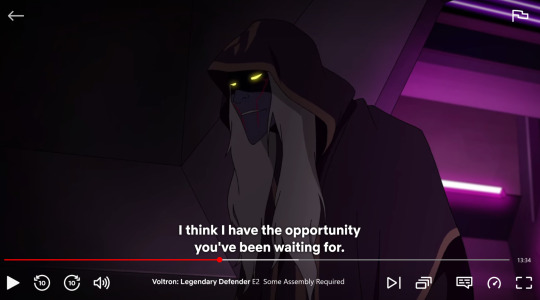
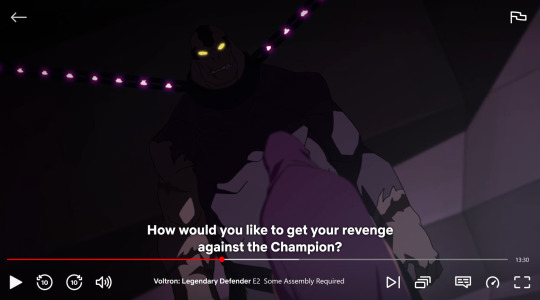
Because why would Haggar bother asking if Myzax wanted revenge against Shiro if he wasn’t even going to remember anything after she turned him into a Robeast?
This basically implies that all of the extra Shiro bodies that we saw at the cloning facility in S6E05 The Black Paladins were basically the organic version of empty Robeast shells - lifeless and incapable of independent movement until Haggar does her ritual to transfer the pilot/model’s quintessence into the new body.
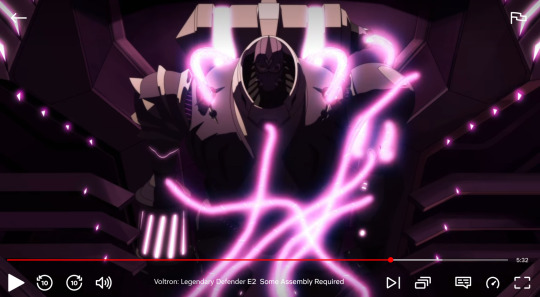
And she has previously demonstrated that physical distance from her target is not an obstacle to being able to transfer a person’s soul from Point A to Point B. Because Season 8 shows that Zarkon was one of the spirits trapped inside her mindscape, even though she wasn’t anywhere near the planet he died on in S5E02.
In fact, “Kuron” being Shiro’s soul moved to a new body would also explain how Haggar and the Operation Kuron staff knew to release “Kuron” when they did. How could Haggar know Shiro was missing from Team Voltron unless she already had the ability to locate, and therefore manipulate his consciousness.
But there’s still one question about the logistics and timeline of “Kuron’s” creation.
Because in S6E06, Shiro indicates that his consciousness has been inside the Black Lion since the end of Season 2.
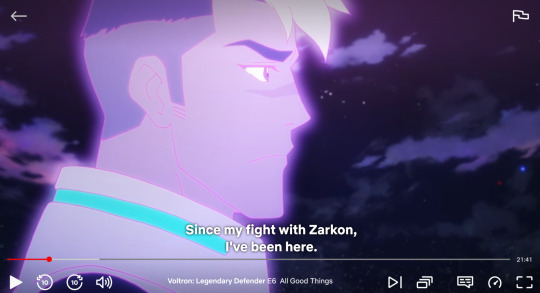
So how exactly could Haggar have yanked his spirit into a new body if he was inside the Black Lion from the end of season 2?
Well perhaps it’s something akin to how Steven’s gem turned into a copy of him when White Diamond removed it in the finale of Steven Universe Season 5.
youtube
That even if she couldn’t get his entire soul before he got absorbed by the Black Lion in S2E13, she only needed a fraction of Shiro’s consciousness in order to animate the new body.
In theory, this could hypothetically allow her to split Shiro’s mind into multiple bodies at once, explaining why S6E05 showed that she had made so many extra bodies.
It would also mean that the merging of the two Shiro’s in Voltron was the equivalent of Steven and Pink Steven fusing back together: Two halves of a single individual being made whole again, rather than one character being sacrificed for another.
youtube
But if the lore indicates that this is one Shiro with two bodies rather than two separate characters, why does Shiro treat his clone self like a separate person?
In one of my older essays, I pointed out how the visuals of Season 6 frame Haggar reclaiming her identity as Honerva in S6E01 as a parallel to Shiro and “Kuron” being merged in S6E07
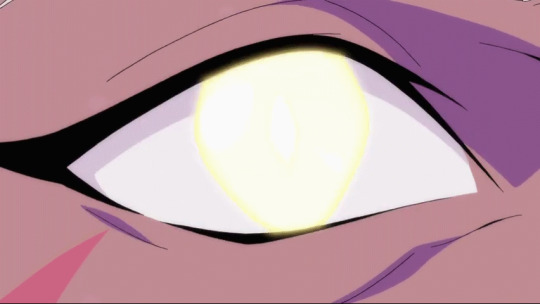
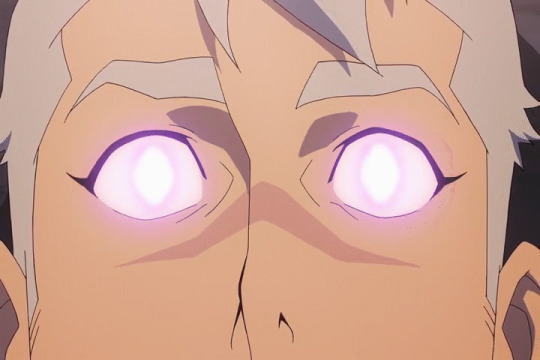
Once Honerva goes through her “merging of two selves”, she tries to distance herself from her actions as Haggar, acting like the things she did to Lotor and others were done by someone else.
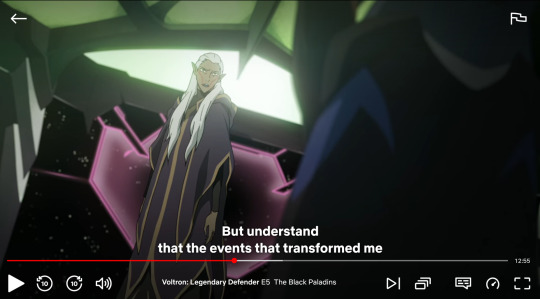
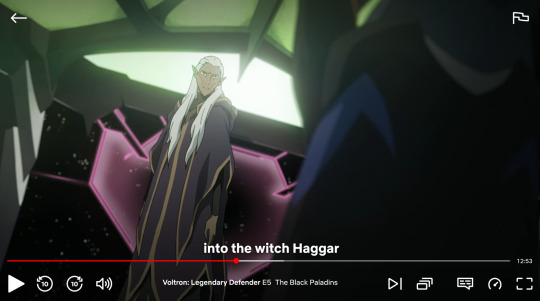
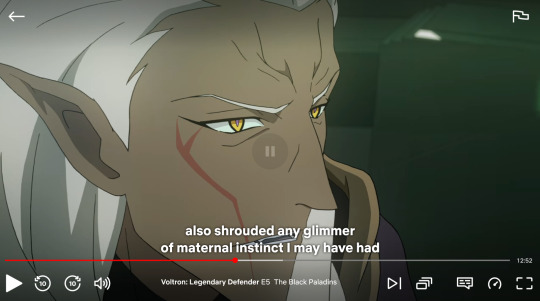
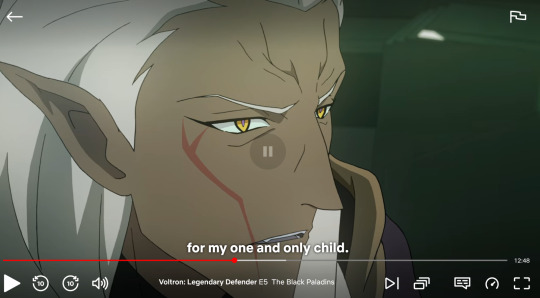
And her reason for doing that is obvious: she doesn’t want to face the fact that she hurt and abused her own son.
So following the parallels between, Shiro treating his actions in Seasons 3-6 like they were committed by a separate person logically reflects a similar level of denial.
Like Honerva, he doesn’t want to face the fact that he’s capable of doing the things he did as “Kuron”.
Because Shiro in Seasons 3-6 is not as patient or compassionate with his team. He’s less considerate of others, and focused on his own priorities above everyone else’s.
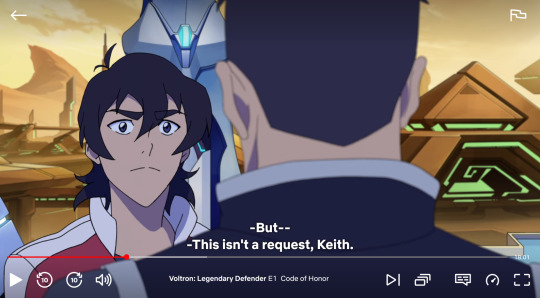
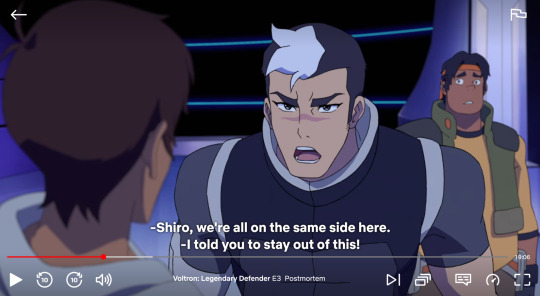
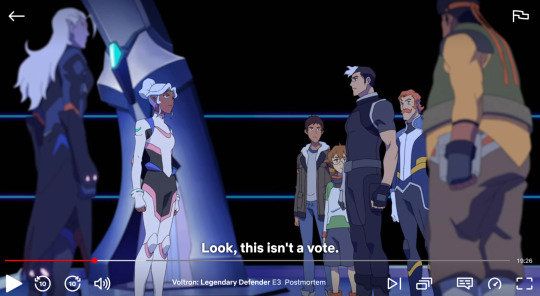
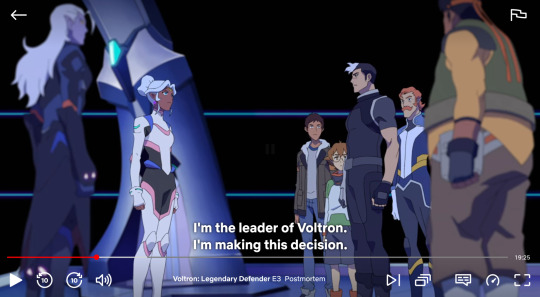
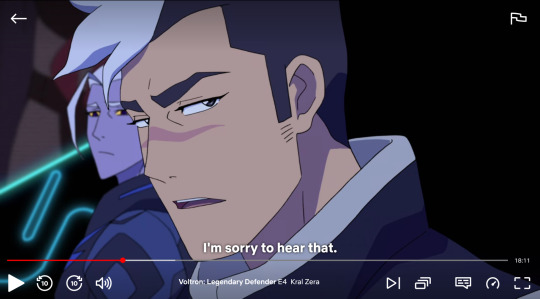
And Season 6, he physically attacks and in at least one case injures the people he cares about.
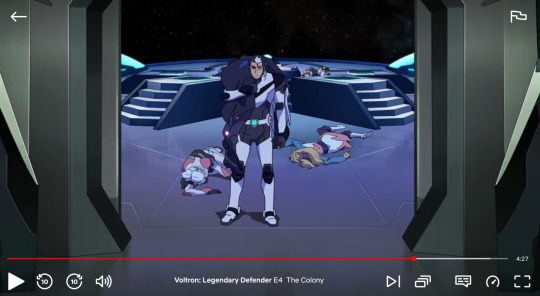
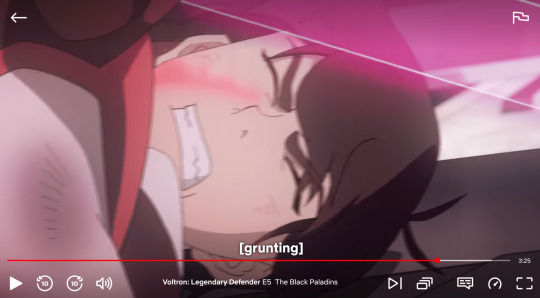
Thanks to WEP’s meddling with Seasons 7-8, the payoff where Shiro recognizes and makes peace with that part of himself got left on the cutting room floor.
But the parallels with Haggar helps to at least make it clear what the writers were going for and what the point of this whole storyline was.
I’ve seen multiple people over the years note that Honerva’s transformation into Haggar, particularly the state we saw her in immediately post-Rift and shortly after Lotor’s birth in S5E02 and S8E02, can be read as a metaphor for Post-Partum Depression or something similar.
If you use their status as parallels to apply a similar logic toward the existence of “Kuron,” then the entire clone subplot can be seen as a fantasy representation of how Shiro is affected by his PTSD.
He goes through a traumatic experience and comes out mostly the same as he was before, but slightly off enough that he doesn’t feel right.
He initially hides his struggles and tries to pretend that everything is fine, downplaying what he’s going through. But eventually the strain starts to become too much and he tries to reach out for help, as we saw him attempt with Lance in Season 5.
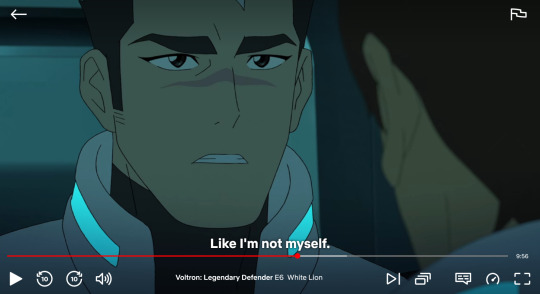
But as we saw, he was brushed aside and his concerns were not taken seriously.
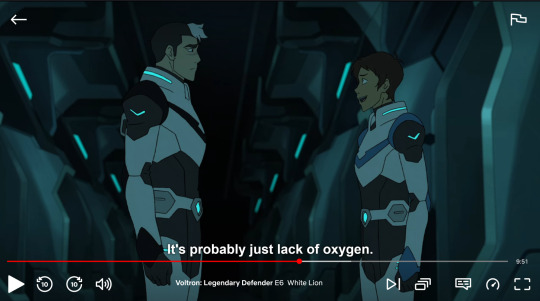
Without support, Shiro eventually reaches his breaking point, culminating in a fight with Keith in The Black Paladins, where - in contrast with his silent and stoic demeanor when carrying out Haggar’s orders - he repeatedly taunts and antagonizes Keith as if he's trying to goad Keith into killing him.
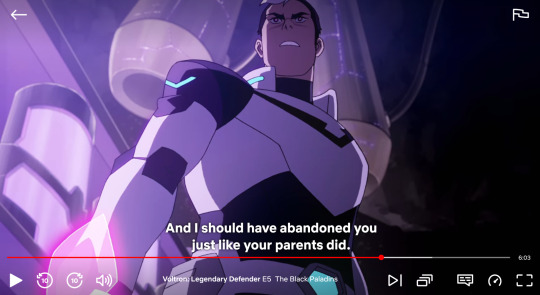
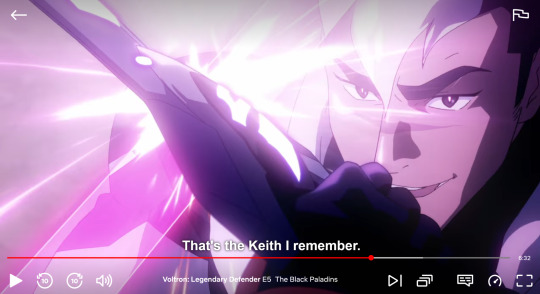
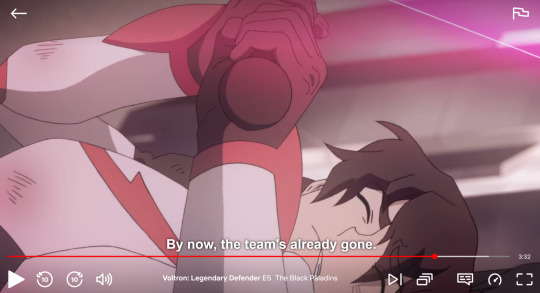
But Keith refuses to leave Shiro or let him die, and makes it clear in S7E01 A Little Adventure that he will never give up on him.
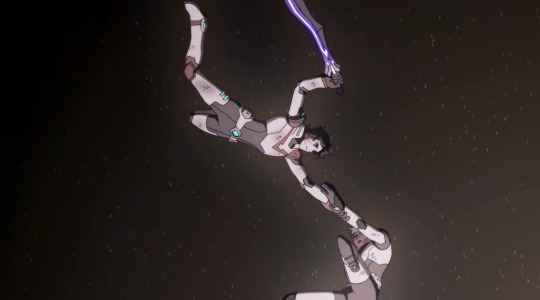
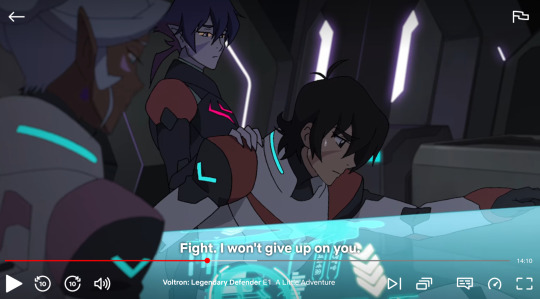
By refusing to let go in S6E05, Keith demonstrates that he will always support Shiro unconditionally, no matter what. This allows Shiro to finally begin to heal and come back to himself.
He’ll never be the same as he was before, but all the pieces of himself are finally whole again.
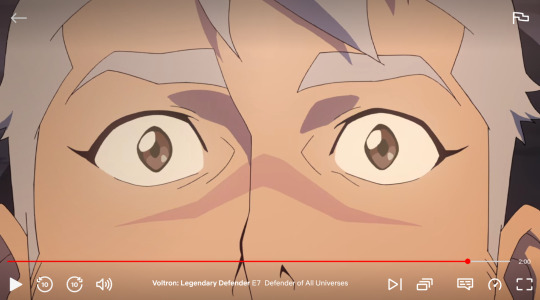
As I’ve outlined in older essays, the main theme of Shiro’s character arc is learning to accept that you don’t have to deal with your problems alone, and that needing support from others does not make you weak.
So when viewed in that context, the entire Operation Kuron subplot serves as a demonstration of what happens when Shiro doesn’t get that help and keeps on trying to deal with his problems alone.
TL;DR: While I understand how the idea became so widely accepted, the concept of “Kuron” as a separate character from Shiro is a fan headcanon that isn’t supported by the show’s lore. Instead, the themes and patterns of the narrative indicate that the “clone” is literally Shiro’s soul in a duplicate body, and the whole Operation Kuron subplot is intended to represent the consequences of his reluctance to let others help him manage his PTSD.
#voltron legendary defender#voltron meta#character analysis#takashi shirogane#vld shiro#operation kuron
70 notes
·
View notes
Note
You know, another thing that always bugged me about VLD is the shape Keith’s Bayard takes.

People always calls it a sword, but honestly it’s more similar to a katar, a type of Indian push dagger. Which is the same overall design as Pidge’s Bayard.


It’s weird that Pidge and Keith both use the same weapon as the base for the form their Bayards take, but Pidge’s has a lot more utility with both its grappling hook and taser functions.
YEAHHH I've noticed how keith's bayard is a katar (ancient weaponry autism go brrrr) and I actually think that works really, really, really well for him. (I'm drawing from Autism Research that I did several years ago so I may be misremembering in which case I'm sorry </3) but iirc, a katar has a lot of power in the forward thrust (because the blade is lined up with the user's arm, so he can put his whole weight into a thrust) but they can also be used for swinging/slashing which is generally what keith's fighting style tends to lean toward. additionally, because traditional katar don't really have a lot of blocking protection on the hilt (unlike a zweihander, for example, which has a pretty useful crossguard) for someone to use a katar they have to be pretty quick and light on their feet to compensate for not having as many defensible qualities. which sounds a lot like keith's fighting style to me. katar are pretty versatile and rely on the intensity and power of their design/technique to punch through an opponent's armor and take them down as efficiently as possible, which just fits keith soooooooo well imo
and for pidge, I also really like her bayard because it reflects her personality and fighting style incredibly well, too. it's probably one of the most versatile weapons used in the entire show with its grappling hook, and the taser adds another range of uses (there's the obvious shocking, but I also remember seeing her use it to cut through hulls and things like that) and for a green paladin who thinks outside the box, a weapon that can be used in so many ways works so well. to address the similarities between pidge's and keith's, I actually think it might just be because of the shape of the bayards themselves. the only other two bayards we see take gun forms, so pidge and keith are the only ones with melee weapons which makes it hard to really tell if that handle shape is the norm for bayards or if it's just their unique personalities. but regardless, the H-shaped handle (the main characteristic in katar) is what all the bayards have in their dormant forms, so it might just be a matter of functionality that the handles for keith and pidge's weapons are also H-shaped
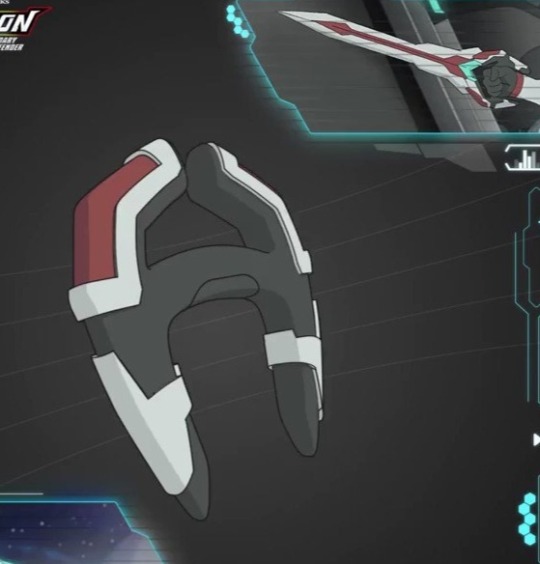
#i think too hard about weapons every day and its one of my charms tbh#GOD the urge to give some of the paladins a polearm bayard in the rewrite......that would be so so so so so sexy#if youve been here long enough youll knowwwww that this is a polearm appreciation blog first and a fandom blog second#but i digress.#woe. another weapons analysis from yours truly be upon ye.#voltron#keith#pidge#xpegasusuniverse#i also think ppl calling keith's bayard a sword is more just. ppl not knowing about different types of swords ykw#like how someone will see a car and go oooh its a car without knowing that it might be a Specific Type of car#or the same thing w guns#and tbh in terms of well known ancient weaponry unfortunately anything that isnt european/western isnt as well known#like everyone knows what a rapier is but a katar?? kusarigama?? katana???#ok maybe ppl know what katana are just because samurai are fairly well known but u know what i mean#anyway i have Got to take another look at katar again because god. i forgot how cool they are
38 notes
·
View notes
Text
Fire Emblem Observation
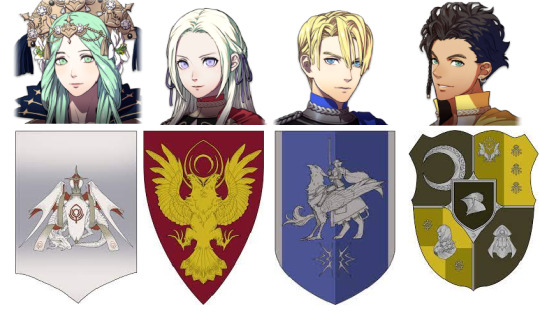
Rhea, leader of the Church of Serios.
Edelgard, leader of the Adrestrian Empire.
Dimitri, leader of the Holy Kingdom of Faerghus.
Claude, leader of the Leicester Alliance.
They're all different, but they share one very unique thing in common.
They all add up to one Prince Lotor.
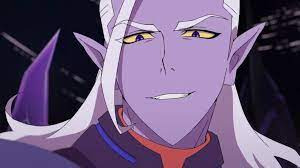
Seriously, I know @ultraericthered made the comparison with Edelgard before, but when you think about it, it's all of them! Rhea is over a thousand years old and believes that unlocking the secret to some great power is the key to ensuring everlasting peace is her conflict-prone setting. Edelgard is a white-haired imperialist who arrogantly thinks she alone has what it takes to change things for the better and will use almost every trick in the book to do so regardless of morality (and is also a huge nerd deep down). Dimitri is a charming, eloquent, handsome prince who has been through some serious trauma and then ultimately snaps, becoming a feral, murderous beast of a man yelling about how he will kill the white-haired girl he once loved. And Claude is a deceptive schemer whose default is not really opening up and trusting others with his ambitions and secrets, and in Three Hopes can become outright devious in the pursuit of the greater good he desires. And the fan discourse surrounding all of these characters often shuns nuance for black-and-white thinking! It's fucking Prince Lotor!
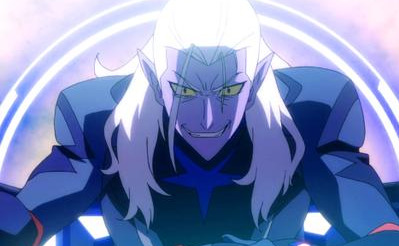
#Fire Emblem#Three Houses#Voltron#Voltron: Legendary Defender#Rhea#Edelgard#Dimitri#Claude#Prince Lotor#Analysis#Comparison#Truthbomb#This has been a PSA
18 notes
·
View notes